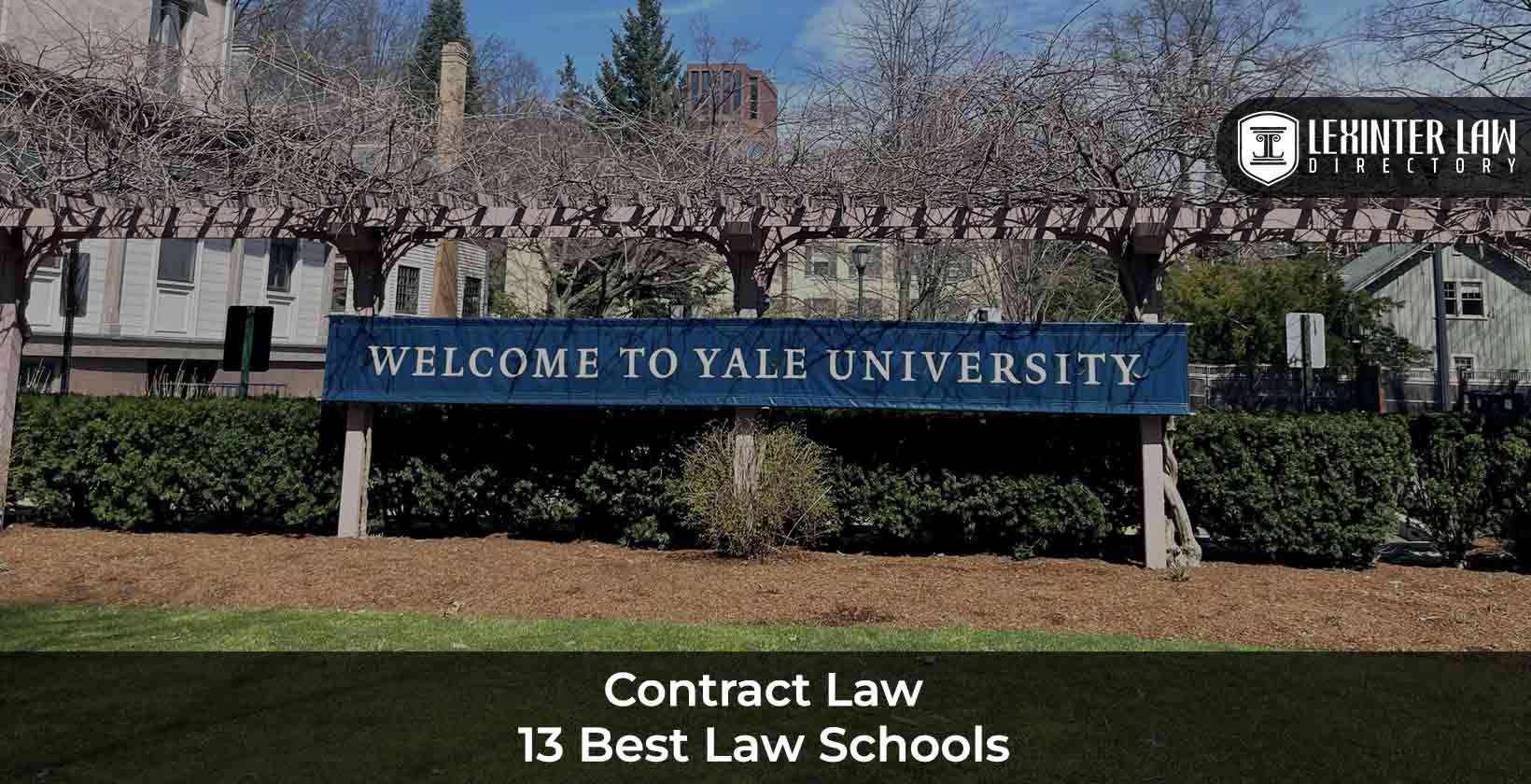13 Best Law Schools For Contract Law
The thirteen best law schools for contract law offer unparalleled opportunities for students aspiring to excel in commercial contract law. Yale University is renowned for producing leaders in contract law degree programs. Columbia University follows closely, distinguished by a rigorous curriculum and expert faculty. Harvard University, with a long-standing tradition of legal excellence, provides comprehensive courses in the law of contracts. The University of Chicago stands out with innovative teaching methods, making the institution a top choice for lawyers pursuing a master’s in contract law. Duke University offers an immersive learning environment, preparing students for real-world challenges in commercial contract law. The University of California-Berkeley benefits from an interdisciplinary approach, integrating theory and practice in the law of contracts. Stanford University’s dynamic program emphasizes cutting-edge legal research, attracting top-tier students worldwide.
The University of Pennsylvania (Carey) combines traditional instruction with modern legal practices, ensuring a robust contract law degree. The University of Virginia excels in preparing students for careers in commercial contract law and boasts distinguished alumni. Georgetown University leverages a Washington, D.C., location to offer unique insights into the law of contracts within the public and private sectors. New York University provides a rich learning experience for a master’s in contract law. The law school stands out globally and has a diverse student body. The University of Michigan (Ann Arbor) strongly focuses on empirical research, enhancing students’ understanding of commercial contract law. Northwestern University completes the list, offering one of the best law schools for contract law. Emphasis on practical skills and theoretical knowledge prepares graduates to excel in contract law degree programs. The institutions collectively represent the pinnacle of legal education in contract law, providing unmatched opportunities for aspiring legal professionals.
Table of Contents
- 1. Yale Law School
- 2. Columbia Law School
- 3. Harvard Law School
- 4. University Of Chicago Law School
- 5. Duke University School Of Law
- 6. UC Berkeley School Of Law
- 7. Stanford Law School
- 8. Penn Carey Law
- 9. University Of Virginia School Of Law
- 10. Georgetown University Law Center
- 11. New York University Law School
- 12. University Of Michigan Law School
- 13. Northwestern Pritzker School Of Law
- How To Choose Law Schools To Contract Law?
- What Do Contract Lawyers Major In?
- How To Find A Good Contract Lawyers Near Me With Lexinter?
1. Yale Law School
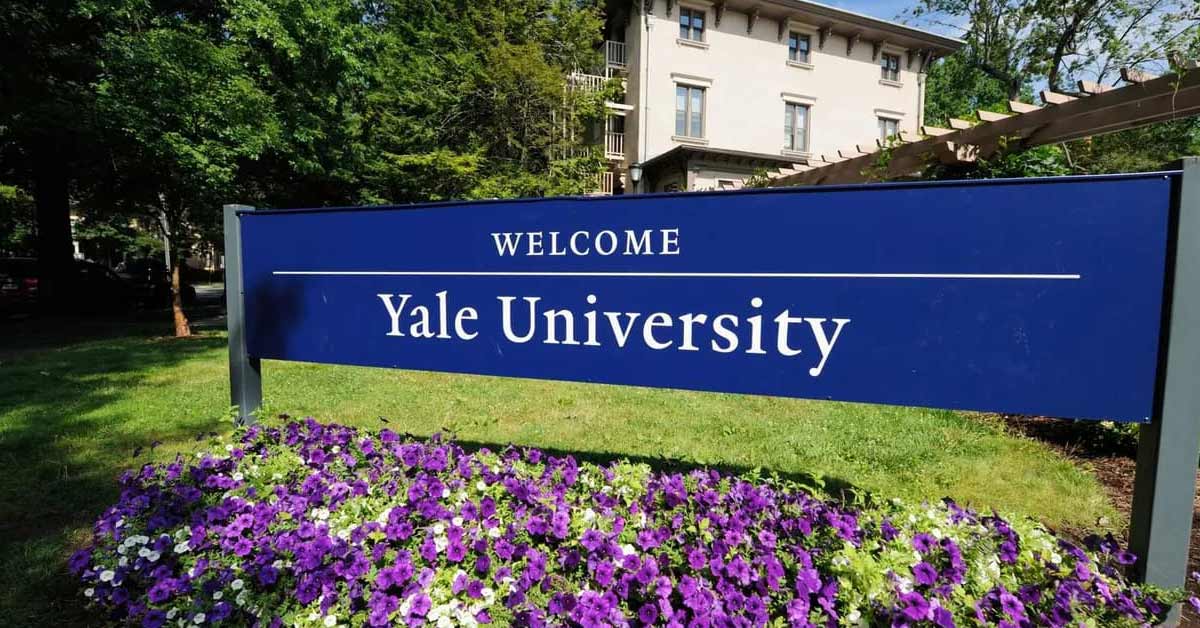
Yale Law School stands as one of the best law schools for contract law. The prestigious school offers unparalleled resources and expert faculty in contract law. The school was established in 1824, situated in New Haven, Connecticut. Students benefit from rigorous coursework, extensive legal research opportunities, and practical experience. Yale Law’s commitment to fostering a deep understanding of legal principles ensures graduates are well-prepared for successful careers in contract law. A notable alumni network and strong connections to the legal community provide invaluable career support and opportunities.
Yale Law School offers diverse law programs tailored to various academic and professional goals. The J.D. program includes nearly 200 courses yearly, providing comprehensive legal education. Students engage in numerous legal clinics and intellectual centers, enhancing their practical skills. The LL.M. program, designed for future law educators, features a flexible curriculum and small class sizes, promoting personalized learning. The J.S.D. program, reserved for LL.M. graduates, emphasizes scholarly research, requiring a substantial dissertation. The M.S.L. program targets non-lawyers seeking foundational legal knowledge, perfect for professionals enhancing their expertise. Joint degree programs integrate law studies with other disciplines, expanding educational opportunities.
Yale Law School’s acceptance rate is 5.58%, with median LSAT scores of 175 and a median GPA of 3.96. The competitive selection process ensures academic excellence. The school maintains a 3:1 student-to-faculty ratio, providing personalized learning. The first-time Bar passage rate is 96.79%, demonstrating strong preparation for legal careers. Yale Law School’s tuition for the 2024-2025 academic year is $76,369, which marks a 3.39% increase from the previous year. The total cost of attendance, including living expenses, books, and other personal costs, is estimated at $100,469. Students receive an average financial aid amount of $32,852, reducing the effective cost to approximately $67,617 for students receiving aid.
Yale Law School ranks first in Best Law Schools, tied with Stanford. Specialty rankings include third in Constitutional Law, second in International Law, and fifth in Clinical Training. Contracts/Commercial Law is ranked seventh, reflecting Yale’s strong emphasis on contract law education. The prestigious ranking reflects Yale’s consistent excellence in academic performance, Bar passage rates, and faculty resources. Yale Law boasts the highest LSAT scores and GPAs among incoming students.
Yale Law School offers specialized programs and courses related to contract law. A notable offering, “American Contract Law I,” is available online through Yale Online. The course and “Contracts II” provide a comprehensive overview of contract law, covering key concepts: contract formation, enforcement, and the Uniform Commercial Code (UCC), which governs the sale of goods. The Center for the Study of Corporate Law promotes teaching and research in commercial law, corporate finance, bankruptcy, and arbitration, enriching the learning experience for students.
Yale Law School features distinguished faculty members specializing in contract law. Anthony T. Kronman, Sterling Professor of Law, has authored books and articles, including “Contracts: Cases and Materials.” Sarath Sanga, Co-Director of the Center for the Study of Corporate Law, focuses on corporate law and contract theory. Yair Listokin, Deputy Dean, integrates macroeconomic perspectives into his contracts research. Ian Ayres, Oscar M. Ruebhausen Professor, explores economic theory in contract law. Daniel Markovits, Guido Calabresi Professor, writes extensively on legal ethics and private law.
Yale Law School offers clinical programs providing hands-on experience in contract law. The Private Law Clinic addresses contract, tort, and property law issues, focusing on consumer protection and affordable housing. The Ludwig Center for Community & Economic Development offers transactional legal services involving contract law. The Entrepreneurship and Innovation Clinic handles legal issues related to contract law and corporate formation. The Financial Markets and Corporate Law Clinic engages students in drafting comment letters on proposed regulations involving contract law aspects. The Strategic Advocacy Clinic provides practical experience, focusing on advocacy and criminal justice reform.
Yale Law School offers extensive networking resources and maintains a strong alumni network in contract law. The Courtyard, an online community, facilitates connections within the YLS network. The Yale Law School Association hosts class reunions and regional gatherings. Career development services through the Career Development Office and The Tsai Leadership Program provide personalized career advising and mentorship in contract law. Notable alumni include Daniel Markovits, Ian Ayres, and Anthony T. Kronman, who contributed significantly to contract law literature and practice.
Yale Law School’s contract law curriculum includes advanced and elective courses that delve into complex legal principles. Advanced Contract Law explores contract formation, performance, breach, and remedies. Students analyze case law and statutory frameworks. Elective courses, such as Comparative Contract Law, examine different legal systems. Negotiation and Drafting Contracts focus on practical skills, teaching students to create and review contracts. Courses on specialized topics, including International Contracts and Contract Theory, provide in-depth understanding. The offerings equip students with comprehensive knowledge and practical skills essential for legal practice and academic research in contract law.
Yale Law School’s employment outcomes for the Class of 2023 are impressive, reflecting the high graduate demand. Ten months after graduation, 96.8% of graduates were employed, securing full-time, long-term positions requiring Bar passage. Fifty-four graduates accepted federal judicial clerkships, and thirty-eight entered public interest roles. The Career Development Office provides extensive support, helping students navigate career planning, job searches, and networking opportunities. Yale’s robust employment rate highlights its commitment to preparing students for successful legal careers, especially in contract law.
2. Columbia Law School
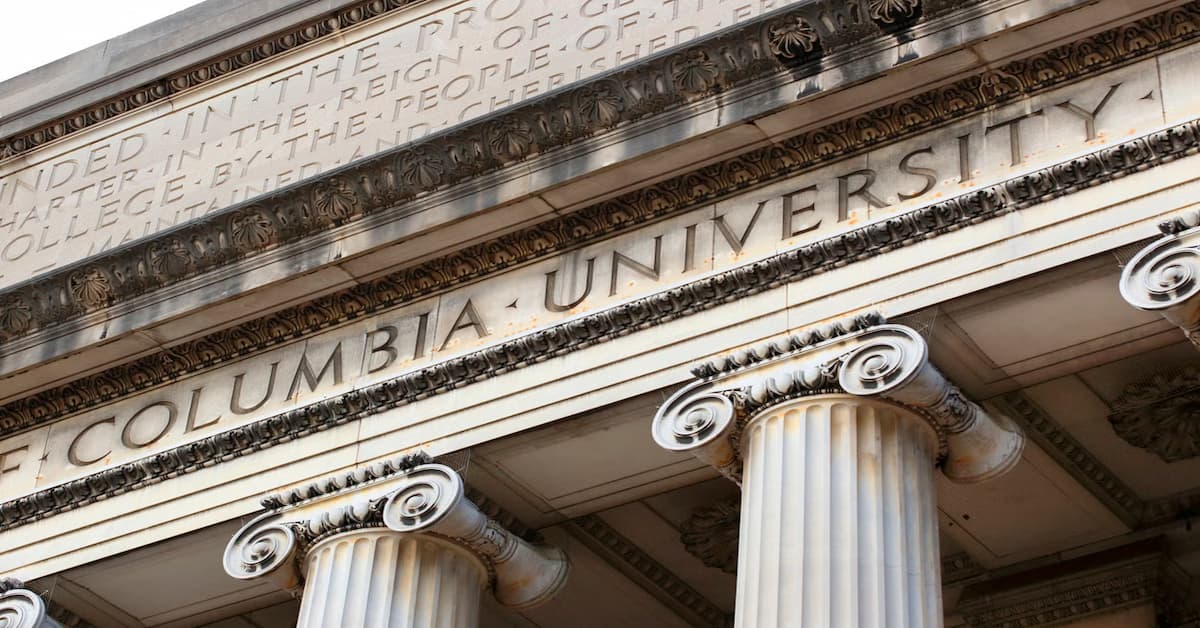
Columbia Law School excels in contract law, making the institution a top choice for aspiring contract law professionals. The school’s contract law curriculum is comprehensive and rigorous. Columbia Law School, established in 1858, has a long history of academic excellence and prestige. The law school, situated in New York City, offers students unparalleled opportunities to engage with the legal industry. Columbia Law School’s extensive resources and networks prepare graduates for successful careers. The school’s commitment to innovation and practical experience ensures a well-rounded legal education.
Columbia Law School offers a diverse range of law programs. The Juris Doctor (J.D.) program provides a rigorous foundation in law, featuring essential courses in Constitutional Law, Contracts, Criminal Law, Property, Torts, and Legal Methods. First-year students engage in the Foundation-Year Moot Court, developing practical legal writing and argumentation skills. The Master of Laws (LL.M.) program caters to legal professionals seeking to deepen their expertise, requiring 24 academic credits and mandatory courses. Completing a writing project and earning experiential credits through clinics, externships, and workshops is essential for graduation. The Doctor of the Science of Law (J.S.D.) program is Columbia’s most advanced law degree, involving intensive research and dissertation completion.
Columbia Law School, a private institution in New York City, has an acceptance rate of 12.2%. The highly competitive rate reflects the school’s rigorous admission standards. The average LSAT score for enrolled students is 173, and the average GPA is 3.90, indicating the high academic caliber of the student body. Columbia Law School maintains a student-to-faculty ratio of 4:1, ensuring personalized attention and mentorship from distinguished faculty members. The Bar exam pass rate for first-time takers is 93.7%, demonstrating the effectiveness of the school’s rigorous training program. Columbia Law School ranks #8 among the best law schools, reflecting its strong academic reputation. Columbia Law School holds the top spot in Contracts/Commercial Law and ranks #2 in Business/Corporate Law. Other notable rankings include #6 in Environmental Law and Tax Law, #4 in International Law, and #7 in Constitutional and Criminal Law. The rankings demonstrate Columbia Law’s excellence in various legal fields, particularly contract and environmental law.
Columbia Law School offers specialized programs in contract law, including Advanced Contracts, Commercial Transactions, and the Uniform Commercial Code. Students take Contract Drafting and Negotiation, providing practical skills in legal documentation and dispute resolution. The Comparative Contract Law course explores contract law principles in various jurisdictions. Seminars on Contemporary Issues in Contract Law and workshops on Contract Theory are available for interested students. The programs ensure a comprehensive understanding of contract law, preparing students for successful legal careers.
Columbia Law School boasts a distinguished faculty specializing in contract law. Jody Kraus, Alfred McCormack Professor of Law, teaches introductory and advanced courses on contracts, the Uniform Commercial Code, and contract theory. Robert Scott, Alfred McCormack Professor Emeritus, directs the Center for Contract and Economic Organization, contributing significantly to contract law and commercial transactions. Avery W. Katz, Milton Handler Professor of Law, focuses on contract theory and economic reasoning in law, teaching courses on Contracts and Commercial Transactions. Aditi Bagchi, Visiting Professor of Law, explores contract interpretation and the political and moral philosophy of contracts. The esteemed professors provide students with a comprehensive education in contract law.
Columbia Law School offers clinical opportunities in contract law, providing hands-on experience and practical skills. The Entrepreneurship and Community Development Clinic represents start-ups and small businesses, advising on corporate formation, employment law, and contract drafting. The Lawyering in the Digital Age Clinic explores technology’s impact on law, involving projects that improve access to justice. The Mediation Clinic trains students in negotiation and mediation, working with the United Nations diplomatic corps. The clinics develop essential lawyering skills and fulfill Columbia Law School’s experiential learning requirements.
Columbia Law School boasts a robust network of notable alumni in contract law, supported by various networking opportunities for students. Events and conferences featuring prominent speakers in contract law provide engagement opportunities. The Center for Contract and Economic Organization facilitates networking through events and research activities. Harvey J. Goldschmid, Jody Kraus, Robert E. Scott, Avery W. Katz, and Lynnise Pantin are notable alumni of contract law. Students connect with alumni through reunions, regional events, and career networking sessions, fostering mentorship and career development. The opportunities ensure valuable connections and support for advancing careers in contract law.
Columbia Law School’s contract law course curriculum offers a range of advanced and elective courses that provide deep insights into contractual principles. Advanced Contract Law covers contract formation, performance, breach, and remedies, focusing on real-world applications. Elective courses include Comparative Contract Law, exploring different legal systems, and Contract Drafting and Negotiation, which hone practical skills. Specialized courses such as International Commercial Contracts and Contract Theory offer in-depth analysis of complex issues. The courses equip students with essential understanding and practical expertise for navigating contract law.
Columbia Law School graduates enjoy robust employment outcomes, reflecting their high demand. The Class of 2023 saw 95.1% securing long-term, full-time legal positions. Employment spans various sectors, including major law firms, government agencies, public interest organizations, and judicial clerkships. Notable employers include the U.S. Department of Justice, Human Rights Watch, and the Federal Trade Commission. Extensive career resources are provided by Columbia Law, offering counseling, mentoring, and job search tools. The vast alumni network of over 27,000 professionals worldwide aids students. The strong support system ensures students transition into successful legal careers across diverse fields, including contract law.
3. Harvard Law School
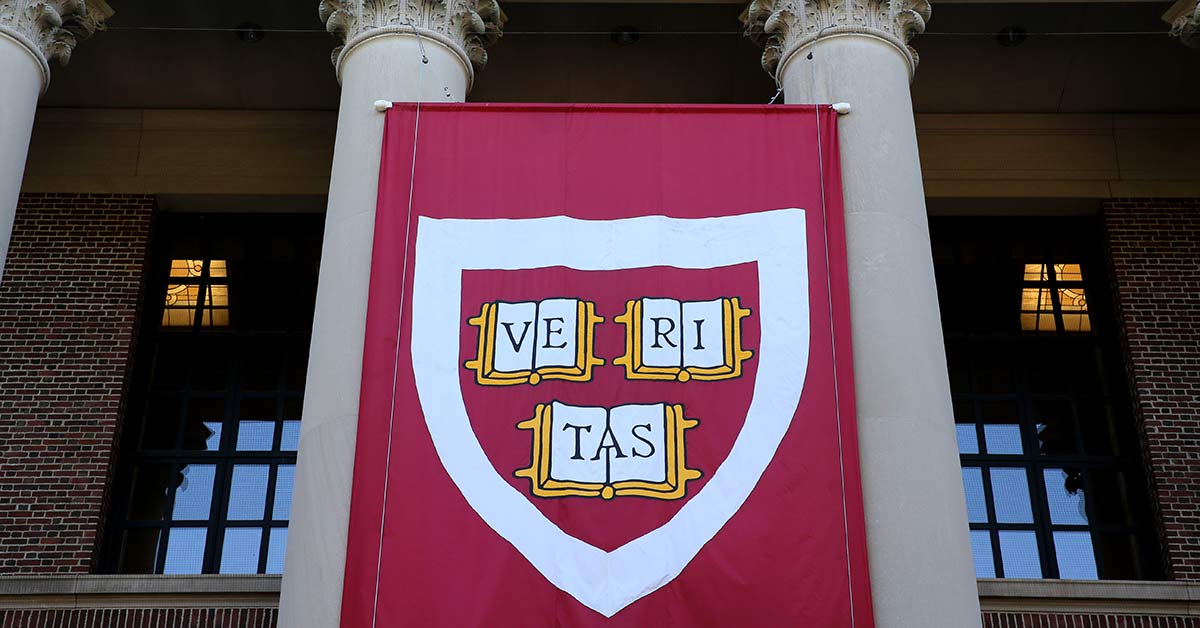
Harvard Law School stands as one of the best law schools for contract law.
The law school offers rigorous courses and distinguished faculty, excelling in preparing students for careers in contract law. Harvard Law, founded in 1817, is in Cambridge, Massachusetts. The school has a rich history of academic excellence and innovative legal education. Students benefit from numerous resources, including extensive libraries and cutting-edge legal clinics. Harvard Law’s curriculum includes comprehensive courses in contract law taught by renowned experts. Harvard Law’s emphasis on critical thinking and practical skills ensures students are well-equipped for the legal profession.
Harvard Law School offers a variety of comprehensive and specialized law programs designed to cater to diverse interests. The Juris Doctor (J.D.) program is Harvard Law School’s flagship program, providing a solid foundation in law, critical thinking, and practical skills. Core courses include constitutional law, contracts, and torts alongside various electives. The Master of Laws (LL.M.) program is a one-year degree tailored for lawyers who wish to deepen their knowledge in specific areas of law or broaden their understanding of the legal system. The program attracts international students and offers the flexibility to design a personalized curriculum from various courses and clinics.
Harvard Law School’s acceptance rate for the class entering 2024 is about 9.58%, reflecting the institution’s rigorous selection process. Applicants generally present strong academic credentials. The middle 50% of admitted students have LSAT scores between 171 and 176 and undergraduate GPAs ranging from 3.84 to 3.99. Harvard Law School’s tuition for the 2023-2024 academic year costs $75,008. Additional expenses, including mandatory fees, housing, food, books, and personal expenses, bring the total estimated cost of attendance to approximately $116,000 per year.
Financial aid and scholarships are available, with 42.55% of students receiving an average of $31,240. Financial assistance significantly reduces the burden on students, making education more accessible and affordable.
Harvard Law School is renowned for its prestigious legal education and ranks prominently across various specialties. The school holds top positions in multiple areas, tying for 1st in Constitutional Law, 2nd in Contracts/Commercial Law, and 2nd in Criminal Law. The law school excels in International Law, ranking 2nd. Harvard Law School maintains a strong reputation for academic excellence and leadership in legal education. Harvard Law School offers specialized programs in contract law, including advanced courses in Contract Drafting and Negotiation. The Program on Negotiation provides practical skills for resolving contract disputes. The HLS Case Studies program allows students to analyze real-world contract issues. Students gain hands-on experience working on actual client matters in the Transactional Law Clinics. The programs provide comprehensive knowledge and practical skills in contract law.
Harvard Law School boasts distinguished faculty experts in contract law. Oren Bar-Gill, the William J. Friedman and Alicia Townsend Friedman Professor of Law and Economics, focuses on the law and economics of contracts. Bar-Gill has authored significant publications on consumer markets and information theory in contract law. Charles Fried, the Beneficial Professor of Law, is known for his influential book “Contract as Promise,” which offers deep insights into the theoretical underpinnings of contract law. The professors and others at Harvard provide students with unparalleled expertise, blending theoretical knowledge with practical applications in contract law.
Harvard Law School, one of the top law schools in Massachusetts, offers extensive clinical opportunities for aspiring contract lawyers. Students interested in contract law engage in Transactional Law Clinics (TLC). The clinics enable students to work directly with clients on business formation, contract negotiation, drafting, commercial financing, and real estate transactions. Students gain hands-on experience under the supervision of experienced practitioners. Specialized areas include the Business and Non-Profit Clinic, Real Estate Clinic, Entertainment Law Clinic, and Community Enterprise Project. The clinics provide legal assistance to small businesses, entrepreneurs, non-profits, and community groups.
Harvard Law School offers robust networking opportunities and a distinguished alumni network for students interested in contract law. HLS Amicus, an online directory, helps alumni reconnect and form new relationships. Alumni events, including reunions and special interest meetings, foster professional networking and discussions on trending topics related to contract law. The Office of Career Services (OCS) and Bernard Koteen’s Office of Public Interest Advising (OPIA) provide job search strategies, career transition support, and access to job banks. Notable alumni in contract law include Elizabeth Warren, David Souter, Stephen Breyer, Charles Ogletree, and Annette Gordon-Reed. The resources and connections provide lifelong support and opportunities for professional growth in contract law.
Harvard Law School’s contract law curriculum offers a comprehensive range of advanced and elective courses. Advanced Contract Law covers essential topics, including contract formation, performance, breach, and remedies, focusing on theoretical and practical aspects. Elective courses include Comparative Contract Law, which examines different legal systems. Drafting and Negotiating Contracts helps students develop practical drafting skills. Specialized courses, including International Contracts and Contract Theory, provide in-depth analysis of complex legal issues. The offerings equip students with the knowledge and skills necessary to excel in contract law. Harvard Law School’s Class of 2023 demonstrated strong employment outcomes. A significant majority secured long-term, full-time positions across various legal fields, including contract law. Ninety percent of graduates obtained long-term, full-time legal jobs, while 96.3% secured long-term or full-time positions. Law graduates joined large law firms, with others entering government, public interest, judicial clerkships, academia, and business sectors.
4. University Of Chicago Law School
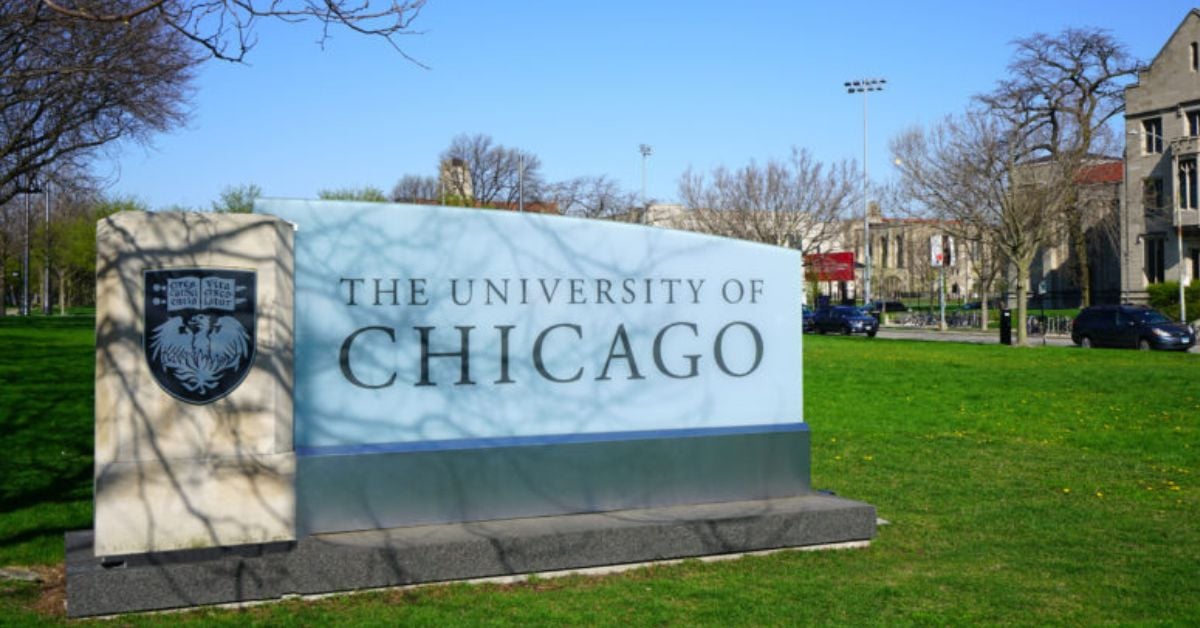
The University of Chicago Law School stands out as one of the best law schools for contract law. The University of Chicago Law School, established in 1902, offers a rich history of academic excellence. The school in Hyde Park, Chicago, provides students access to vast legal resources and opportunities. A diverse and inclusive environment encourages collaboration and innovation. The school emphasizes practical experience through clinics and externships, enhancing students’ real-world legal skills.
The University of Chicago Law School offers a range of distinguished law degree programs. The Juris Doctor (JD) is the foundational program that delivers a rigorous legal education. The Master of Laws (LLM) offers advanced studies in law for international lawyers. The Doctor of Juridical Science (JSD) and Doctor of Comparative Law (D.Comp.L) are research-focused degrees. The JSD is tailored for individuals aspiring to make significant contributions to legal scholarship, while the D.Comp.L emphasizes comparative legal systems. The programs are renowned for their academic excellence and scholarly environment, attracting students globally. Chicago Law School, one of the best law schools in Illinois, offers diverse opportunities for academic and professional growth in law.
The University of Chicago Law School had an acceptance rate of 12.78% for the 2023-2024 academic year. The median LSAT score for enrolled students reached 173, while the median GPA was 3.94. Tuition for the academic year was $77,877, with total costs including living expenses, books, supplies, transportation, and personal expenses amounting to approximately $106,225. Law students receive financial aid, with 83.11% obtaining grants or scholarships. The average grant amount is $15,000, reducing the cost of attendance to about $91,225 for students who receive aid.
The University of Chicago Law School ranks third among the best law schools. The law school excels in Business/Corporate Law, ranking fourth, and holds the forty-sixth spot in Clinical Training. The school’s Constitutional Law and Contracts/Commercial Law programs rank second. Criminal Law holds the twelfth spot, while Environmental Law stands at fifty-third. The University of Chicago Law School offers specialized programs in contract law. Advanced courses include “Contracts,” “Commercial Transactions,” and “Advanced Contract Law.” The contract law programs focus on critical analysis, practical applications, and complex contract negotiation. The curriculum features seminars, workshops, and clinics that provide hands-on experience. Students engage in research projects and moot court competitions, enhancing their understanding of contract law. The law school emphasizes theoretical foundations and practical skills, preparing students for successful careers in contract law.
The University of Chicago Law School excels in contract law education through distinguished faculty. Professor Eric Posner, known for his research and “Contract Law and Theory,” plays a key role. Professor Randal C. Picker brings a unique perspective by integrating technology and intellectual property. Professor Anthony J. Casey enhances the curriculum by focusing on business law, finance, and corporate bankruptcy. The diverse research interests create a comprehensive learning environment for students specializing in contract law.
The University of Chicago Law School offers clinical opportunities for students interested in contract law. The Kirkland & Ellis Corporate Lab provides hands-on experience with multinational companies. The clinic helps students develop legal and business skills through classroom instruction and real-world projects. Students participate in negotiations, draft contracts, and engage in the annual Transactional Challenge. The Housing Initiative Transactional Clinic allows students to work on affordable housing transactions, gaining experience in drafting and negotiating contracts for housing development.
The University of Chicago Law School excels in contract law education and provides robust networking opportunities for students and alumni. Events, including the New York City Alumni Networking Reception, foster connections among graduates and professionals in various fields, including contract law. The Affinity Mentoring Programs, including APALSA, SALSA, BLSA, LLSA, and OutLaw, offer tailored mentorship and networking opportunities. Notable alumni in contract law include Edward Levi, former U.S. Attorney General, and David Rubenstein, co-founder of The Carlyle Group. Founders of major law firms Kirkland & Ellis, Baker McKenzie, and Jenner & Block showcase the school’s strong legacy in the legal field.
The University of Chicago Law School offers a comprehensive curriculum in contract law. Advanced courses include “Advanced Contracts: Theory and Practice,” which delves into complex contract issues. Another course, “Contracts and Commercial Law,” focuses on commercial transactions. Electives like “Negotiation and Drafting” teach practical skills for drafting and negotiating contracts. “Comparative Contract Law” explores contract principles across different legal systems, and “International Commercial Arbitration” covers dispute resolution in international contracts. The courses give students an in-depth understanding of contract law and prepare them for various legal challenges in their professional careers.
The University of Chicago Law School reports strong employment outcomes for the Class of 2023. A total of 93.9% of graduates secured long-term, full-time legal jobs, with 98.6% obtaining any long-term job. Judicial clerkships were secured by 27% of graduates, predominantly federal clerkships. Graduates found employment across the U.S., mainly in the Mid-Atlantic, East-North Central, and Pacific regions. The majority joined law firms, with 88.1% at firms with more than 500 lawyers. The impressive outcomes underscore the school’s robust programs, including contract law.
5. Duke University School Of Law
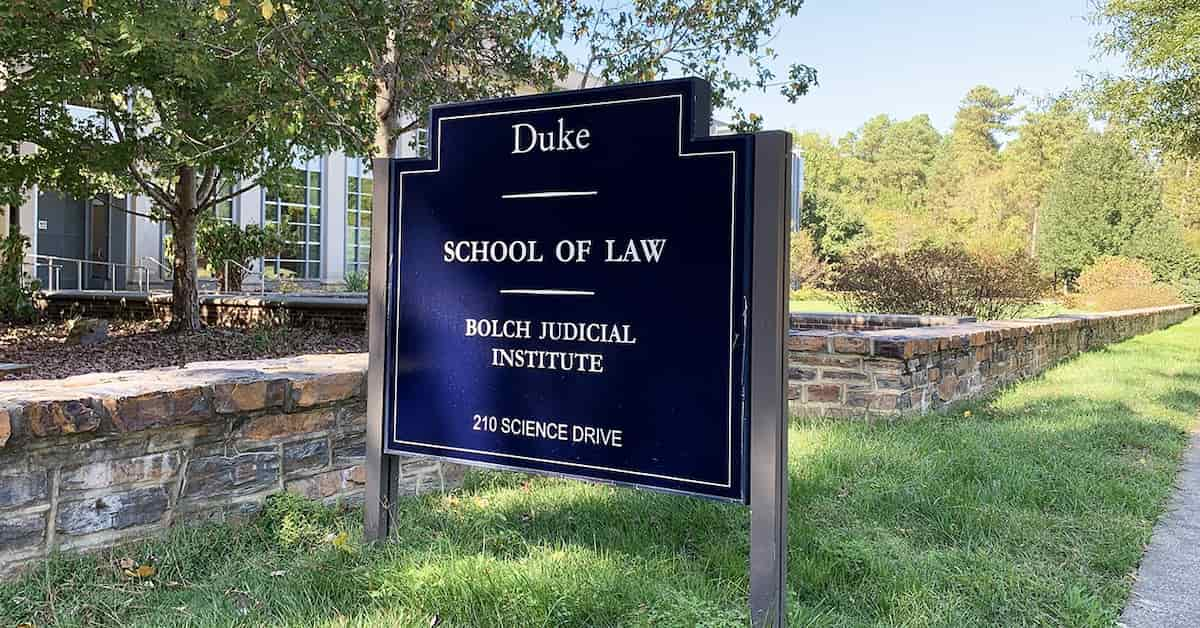
Duke University School of Law ranks among the best law schools for contract law. The institution offers an unparalleled education in contract law. The school was established in 1930 in Durham, North Carolina. The institution has a strong reputation for academic excellence and innovative programs. Students benefit from a diverse and inclusive environment, fostering global perspectives and practical skills. Faculty members emphasize experiential learning, integrating classroom knowledge with real-world applications.
The law school offers various programs, each designed to prepare students for leadership in the legal field. The JD program, known for its rigor and innovation, combines traditional courses with experiential learning and interdisciplinary opportunities. Duke’s JD students benefit from a collaborative environment and a strong commitment to public interest and pro bono work. Graduates of foreign law schools enroll in Duke’s LLM program, gaining a comprehensive understanding of the U.S. legal system. The program attracts seasoned professionals from diverse legal backgrounds, offering advanced courses in specialized areas of law.
Duke University School of Law for the 2024 academic year boasts an acceptance rate of 10.51%. The rate reflects stringent admission criteria and high applicant qualifications. Admitted students generally achieve a median LSAT score of 170 and maintain a median GPA of 3.87. Duke University School of Law’s tuition and fees for the 2024 academic year amount to $75,618, reflecting a 4.11% increase from the previous year. The cost covers essential aspects of the educational experience, including instruction and access to resources integral to Duke Law’s rigorous academic environment. The total cost of attendance, encompassing room and board, books, and personal expenditures, is approximately $100,226. The comprehensive figure underscores the financial commitment required for students pursuing legal education at Duke Law.
Duke University School of Law is ranked 4th in the 2024 U.S. News & World Report’s Best Law Schools rankings. The school excels in several specialty areas, ranking 5th in Constitutional Law, 6th in Business/Corporate Law, and 7th in Clinical Training. Duke Law holds the 7th position in Contract Law. Duke Law is renowned for its rigorous academic programs and distinguished faculty. The school places a strong emphasis on practical experience. Commitment to excellence and innovation in legal education ensures graduates are well-prepared for successful careers in various legal fields.
Duke University School of Law offers a range of specialized programs in contract law. Students explore advanced coursework, including Contract Drafting, Negotiation, and Commercial Transactions. Faculty members with expertise in contract law guide students through complex legal principles and real-world applications. Duke University School of Law boasts a strong faculty with deep expertise in contract law. Professors like Jeremy Mullem, who directs the Legal Writing Program, teach courses on Contract Drafting and Legal Analysis, providing students with essential practical and theoretical knowledge. Specialized courses, including “Contract Drafting: The Next Generation,” focus on practical drafting skills and the future of contract automation. Faculty members Joseph Blocher and Erin Blondel ensure comprehensive coverage of contract law topics, enriching the academic environment.
Duke University School of Law provides extensive clinical opportunities in contract law and related fields. Students gain practical experience through the Civil Justice Clinic, handling cases including breach of contract, housing disputes, and consumer protection. Students work under the supervision of experienced faculty and Legal Aid of North Carolina staff attorneys. Externship programs allow students to apply classroom knowledge to real-world situations. The programs help students hone their legal skills. Clinics and externships bridge the gap between academic learning and practical lawyering, preparing students for professional success.
Duke University School of Law provides numerous networking opportunities, especially in contract law. A vibrant alumni network of over 12,000 graduates worldwide offers various ways to connect and engage through events, mentorship, and volunteer opportunities. Alumni participate in local events, provide career mentorship, and serve on leadership boards. The activities help current students build professional connections and gain insights into their career paths. Notable Duke University School of Law alumni contributing significantly to contract law include several distinguished individuals. Marc Elias, a Duke Law graduate, played a crucial role as general counsel for major presidential campaigns. Another distinguished alumnus, Kenneth Starr, served on the U.S. Court of Appeals and gained recognition for his contract law expertise. Jeffrey Lichtman, known for complex legal agreements in high-profile cases, showcases Duke Law’s strength in contract law education.
Duke University School of Law offers a comprehensive curriculum in contract law, emphasizing advanced courses and electives. Students enroll in specialized classes, including “Advanced Contracts,” focusing on complex contractual issues and negotiations. “International Commercial Arbitration” provides insight into resolving cross-border disputes. “Drafting and Negotiating Commercial Agreements” teaches practical skills for crafting detailed contracts. “Corporate Finance and Contracts” covers the intersection of financial principles and contract law. Seminars on “Contract Theory” explore theoretical frameworks and their applications. Electives in “Intellectual Property Licensing” and “Real Estate Transactions” allow students to tailor their studies to specific interests, enhancing their expertise in contract law.
Duke University School of Law consistently achieves high employment outcomes for graduates, including students in contract law. The Class of 2023 had 97% employed in long-term, full-time positions requiring Bar passage or J.D. advantage roles. A significant number, 140 graduates, joined law firms with over 500 attorneys, while others found positions in smaller firms. Twenty-six graduates chose judicial clerkships for federal courts and 9 for state courts.
6. UC Berkeley School Of Law
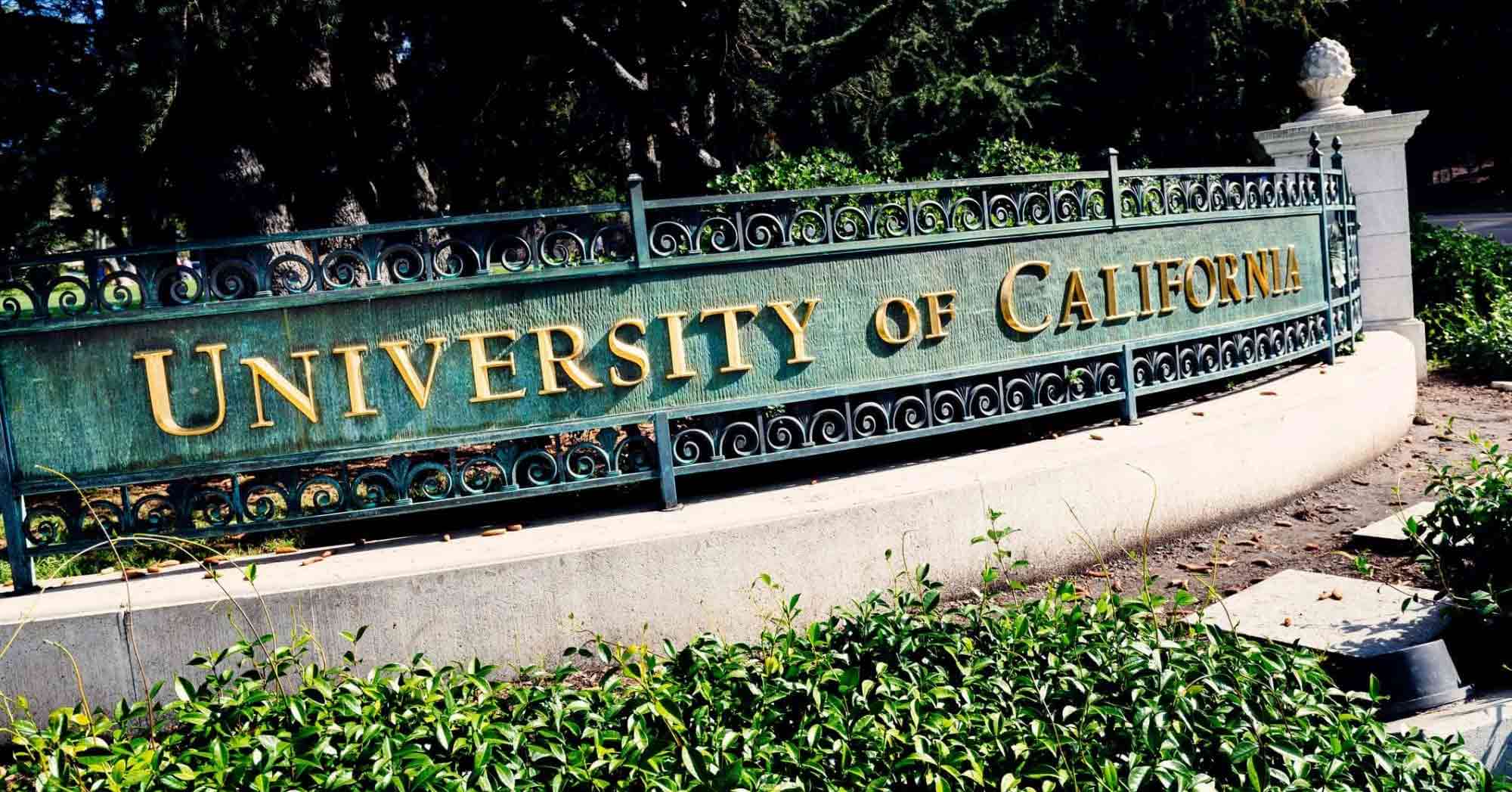
The University of California, Berkeley excels in contract law education, ranking among the top schools in the field. Berkeley Law, established in 1894, is in Berkeley, California. The law school offers a wide range of programs and maintains a reputation for academic excellence and innovation. The school’s connections with local and global industries provide students with extensive networking opportunities. The American Bar Association accredits Berkeley Law, ensuring a high standard of legal education.
Berkeley Law offers several prestigious law degrees. The JD program spans three years, preparing students for various legal careers focusing on academic excellence, professional leadership, and public service. Opportunities for specialization include business law, environmental law, law and technology, international legal studies, and social justice. The LLM program, tailored for international students and U.S. lawyers, provides advanced legal training and flexibility to customize the curriculum. The JSD program emphasizes independent research, leading to a dissertation that contributes significantly to law.
The University of California, Berkeley School of Law has an acceptance rate of approximately 14.92% for the 2024 academic year. The competitive program requires a median LSAT score of 170 and a median undergraduate GPA of 3.87. Tuition and fees for the JD program in 2024 are $63,196 for California residents and $75,624 for non-residents. All UC students must have health insurance, costing $6,442 annually, though a waiver is available for students with comparable coverage.
The University of California, Berkeley School of Law ranks 12th in the 2024 U.S. News & World Report law school rankings. The school excels in Intellectual Property Law and Environmental Law, ranking first. The law school holds second place in Criminal Law/Criminal Procedure and third in Business Law. Berkeley Law maintains a strong reputation due to rigorous academic programs, distinguished faculty, and a commitment to public service. The school fosters an intellectually vibrant and collegial environment, attracting top students and scholars globally.
The University of California, Berkeley School of Law offers specialized programs in contract law. The programs emphasize innovative legal frameworks and practical application. The programs include advanced contract drafting and negotiation workshops. The law school offers international contract law courses and interdisciplinary seminars linking contract law with technology and business. Unique features include real-world contract simulations and collaboration with industry experts. The contract law programs provide students with a comprehensive understanding of contract law.
The University of California, Berkeley School of Law boasts distinguished faculty with expertise in contract law. Professor Hanoch Dagan is known for his work in private law theory and contracts. Professor Adam Badawi focuses on contract and commercial law, corporate finance, and law and economics. Adam uses machine learning to analyze legal documents. Professor Marjorie Shultz specializes in contract and commercial law, critical legal theory, and health law and policy. The faculty members contribute significantly to Berkeley Law’s robust contract law program through their extensive research and practical insights.
The University of California, Berkeley School of Law offers clinical opportunities in contract law through various clinics. Students join the Samuelson Law, Technology, and Public Policy Clinic. The clinic focuses on legal issues involving technology and public policy related to contracts. The International Human Rights Law Clinic and the East Bay Community Law Center offer practical experience. Students participate in advocacy competitions, including the Halloum Negotiation Competition, honing contract negotiation and dispute resolution skills. The clinical experiences make Berkeley one of the top law schools in California.
Berkeley Law provides extensive networking opportunities and has a network of notable alumni in contract law. The Berkeley Law Alumni Association (BLAA) maintains strong connections among alumni, faculty, and students, promoting the law school’s advancement. Graduates automatically qualify for BLAA membership, governed by a board with alumni directors and faculty representatives. Networking resources for contract lawyers include the Berkeley Corporate Counsel Network (BCCN), supporting in-house alumni through events and leadership opportunities. The Career Development Office (CDO) offers career counseling, job search guides, and alumni contacts. Notable alumni in contract law include Thomas W. Caldecott, a former California State Assembly member, and John J. McFall, who served in the California State Assembly and U.S. Congress. The resources provide Berkeley Law graduates with a robust platform for career growth in contract law.
The University of California-Berkeley offers a comprehensive curriculum for advanced contract law courses. Students explore complex topics, including contract interpretation, enforcement, and remedies. Advanced courses include “Advanced Contract Theory,” focusing on theoretical perspectives and their practical applications. “Commercial Transactions” delves into contracts used in commercial settings. Elective courses, including “International Business Transactions,” examine cross-border contract issues. “Law and Economics of Contracts” integrates economic principles into contract analysis. Practical skills courses, including “Negotiation and Drafting,” equip students with hands-on experience. The offerings provide a robust understanding of contract law’s intricacies, preparing students for various legal careers.
Berkeley Law graduates achieve remarkable employment outcomes, with 96.4% employed nine months after graduation and 99.7% securing long-term roles. Barkley Law School graduates succeed in various legal fields, including contract law. Graduates earn a median salary of $205,000 and an average salary of $162,456. An impressive 82.8% of graduates join law firms with more than 501 attorneys. Career paths include judicial clerkships, public interest positions, and government roles, offering diverse opportunities. The outcomes highlight the school’s robust professional support and extensive network of various paths, including contract law.
7. Stanford Law School

Stanford University Law School excels in contract law, ranking among the best in the field. Stanford offers exceptional academic programs and resources. The university, situated in Stanford, California, opened in 1893. The emphasis on interdisciplinary learning enhances the educational experience. Students benefit from extensive research opportunities and practical training. The law library, one of the largest in the nation, supports comprehensive legal studies. Alumni include influential leaders in various legal sectors, contributing to Stanford’s prestigious reputation. The campus fosters a collaborative and inclusive environment.
Stanford University Law School offers diverse law degree programs tailored to different career paths. The Juris Doctor (JD) Program focuses on mastering legal doctrine and practical skills through clinics and externships. The Master of Laws (LLM) program provides specializations in Corporate Governance, Environmental Law, and International Economic Law for students with a primary law degree from outside the U.S. The Stanford Program in International Legal Studies (SPILS) leads to a Master of the Science of Law (JSM) and focuses on interdisciplinary research. The Doctor of the Science of Law (JSD) is an advanced degree for aspiring legal scholars. The Master of Legal Studies (MLS) offers foundational legal knowledge for interdisciplinary research.
The acceptance rate at Stanford University Law School is 7.26% for the 2023-2024 academic year, reflecting the highly selective admissions process. Tuition fees for the period are $73,713, a 6.84% increase from the previous year. The total cost of attendance, including tuition, housing, food, personal expenses, books, and other fees, is estimated at $116,814 for on-campus students and $118,398 for off-campus students.
Stanford University Law School holds the top rank in the 2023-2024 U.S. News & World Report, tied with Yale University. The school ranks #4 in Business/Corporate Law, #2 in Intellectual Property Law, #5 in Tax Law, and #8 in Clinical Training. Stanford Law is renowned for academic excellence and innovative programs integrating theory with practical skills. Influential faculty and a comprehensive legal education prepare students for leadership in various legal fields, including contract law. Specialty rankings highlight the school’s strength across multiple disciplines.
Stanford University Law School offers specialized programs in contract law that set the institution apart. The Advanced Contracts Seminar provides an in-depth analysis of complex contract issues. The Law and Economics program integrates economic principles with contract law studies, enhancing understanding of contractual relationships. The Contract Design and Management program focuses on innovative contract creation and administration approaches. Unique features of the programs include hands-on projects and interdisciplinary coursework, offering students a comprehensive and practical understanding of contract law. The specialized programs prepare students for diverse careers in contract law.
Stanford University Law School has distinguished faculty members specializing in contract law. George Triantis, the Richard E. Lang Professor of Law, focuses on contract design and negotiation dynamics. Richard Craswell, an emeritus professor, is known for his work on the economics and philosophy of promising in contract law. A. Mitchell Polinsky, director of the John M. Olin Program, applies economic theory to contract disputes. Michael Klausner specializes in corporate law and economic analysis of legal issues in contract settings. The experts significantly enhance the understanding of contract law at Stanford.
Stanford University Law School offers clinical opportunities related to contract law through the Mills Legal Clinic. The Organizations and Transactions Clinic allows students to draft and negotiate contracts for various organizations. The Community Law Clinic addresses contract issues in housing and post-conviction relief, providing experience in client representation and legal document drafting. The Juelsgaard Intellectual Property and Innovation Clinic includes licensing agreements for managing intellectual property. The clinics provide practical experience under expert supervision, enhancing students’ contract law skills.
Stanford University School of Law offers a comprehensive contract law curriculum featuring advanced and elective courses. The Advanced Contracts course delves into complex contractual issues, including breach of contract, remedies, and contract interpretation. Elective courses focusing on International Commercial Arbitration emphasize dispute resolution in international contracts. The Negotiation and Drafting of Contracts course emphasizes practical skills in negotiating and drafting various types of contracts. The Comparative Contract Law course explores contract law principles across different jurisdictions. The courses give students a thorough understanding of contract law and essential skills for successful legal practice in diverse fields.
Stanford University School of Law boasts impressive employment outcomes for the class of 2023, including a strong focus on contract law.
A total of 83.6% of graduates secured long-term, full-time legal jobs. Employment of any kind reached 96.7%. Judicial clerkships attracted 24% of graduates, highlighting their high-level placements. Law graduates joined large law firms, emphasizing the demand for Stanford-trained lawyers specially contract lawyers. Law firm salaries ranged from $112,000 to $250,000 annually. Public interest roles offered between $48,000 and $90,000.
8. Penn Carey Law
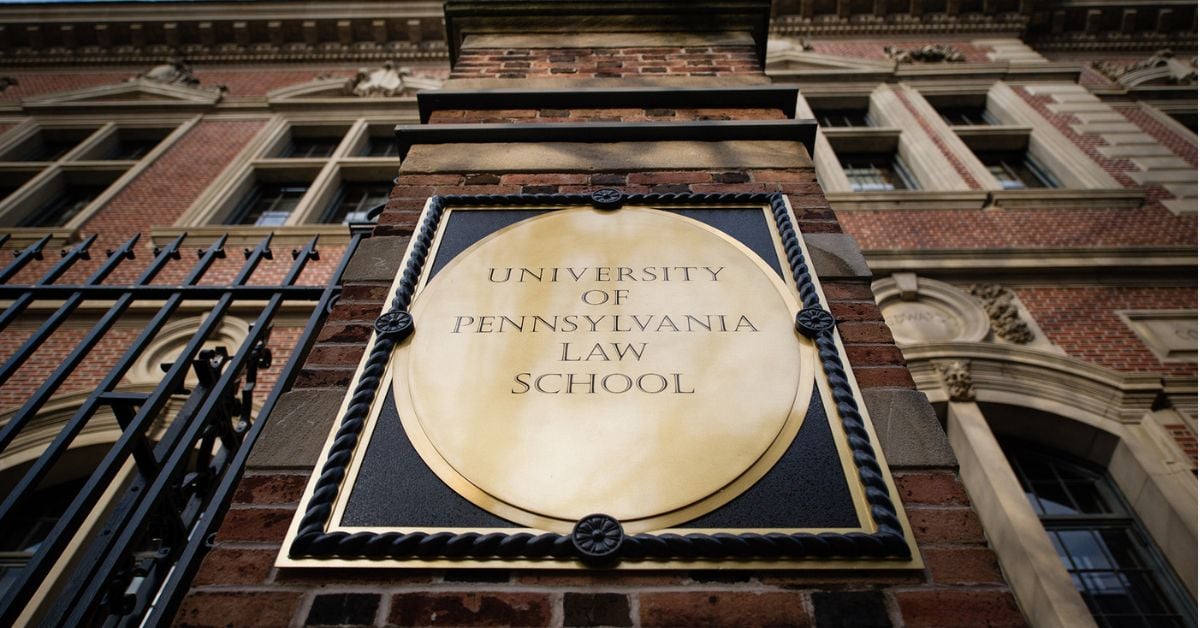
The University of Pennsylvania Carey Law School ranks among the top law schools for contract law. Students receive an exceptional education in contract law, making them highly sought after in the legal field. The school was established in 1850 and has a rich history of academic excellence. The campus sits in Philadelphia, Pennsylvania, offering students access to a vibrant legal community. Students benefit from a diverse and inclusive environment, preparing them for successful legal careers. The University of Pennsylvania Carey Law School offers diverse law degree programs. The JD program emphasizes an interdisciplinary approach, combining law with other fields. Students gain practical experience through clinics, externships, and pro bono work. The LLM program is designed for international attorneys seeking to deepen their knowledge of U.S. law. The one-year program offers flexibility, allowing students to tailor their curriculum. The SJD program is a research-focused degree aimed at aspiring legal scholars. Candidates produce original research and dissertations, contributing to legal academia. The ML program provides a strong foundation for professionals in various legal concepts. Joint degrees are available in collaboration with other Penn schools, including Wharton and the Perelman School of Medicine.
The University of Pennsylvania Carey Law School has a highly competitive acceptance rate of approximately 9.7% for the most recent admissions cycle. The rate makes the school one of the most selective in the country. Admitted students have a median LSAT score of 172 and a median undergraduate GPA of 3.92. Tuition for the 2024-2025 academic year at the University of Pennsylvania Carey Law School is $74,688. Students must pay a general fee of $3,954, a learning support fee of $1,234, and a health clinical fee of $716. The total annual tuition and required fees are $80,592.
The University of Pennsylvania Carey Law School ranks 4th in the 2024 U.S. News & World Report, tied with Harvard Law School. Specialty rankings include Business/Corporate Law at 6th, Constitutional Law at 7th, and Contracts/Commercial Law at 8th. Penn Carey Law, renowned for rigorous academic programs and distinguished faculty, emphasizes interdisciplinary studies, solidifying a leading reputation among top law schools. The strong academic performance and successful graduate outcomes reflect the institution’s commitment to excellence.
The University of Pennsylvania Carey Law School offers specialized programs in contract law. Advanced Contracts and Drafting is a unique feature that provides hands-on experience in contract creation and negotiation. The Law and Economics of Contracts program integrates economic principles to analyze contract structures and outcomes. International Business Transactions offers a global perspective on contract law, setting it apart from other programs. The specialized offerings equip students with comprehensive skills for various contract law careers.
The University of Pennsylvania Carey Law School’s faculty has substantial expertise in contract law. David Hoffman is known for his research in empirical contract law. Lisa Fairfax co-directs the Institute for Law & Economics and specializes in contracts and corporate governance. The faculty’s combined practical experience and academic contributions provide deep insights. The robust understanding of contract law distinguishes Penn Carey Law’s program.
The University of Pennsylvania Carey Law School offers clinical opportunities in contract law. The Transactional Lawyering Clinic allows students to represent clients in transactional matters, including drafting and negotiating contracts. Students in the Entrepreneurship Legal Clinic assist startups and small businesses with forming entities and drafting agreements. The Intellectual Property and Technology Legal Clinic handles drafting and negotiating technology transfer and licensing agreements contracts. Gittis Legal Clinics include the Civil Practice Clinic and the Interdisciplinary Child Advocacy Clinic, involving housing, employment, or family law contracts.
The University of Pennsylvania Carey Law School excels in contract law, offering extensive networking opportunities through alumni mixers, career fairs, and guest lectures with industry leaders. The events help students connect with professionals and gain valuable insights into contract law. Notable alumni include Jena Griswold, Colorado Secretary of State, and Ed Rock, Co-Director of NYU’s Institute for Corporate Governance & Finance. Judge Gene E.K. Pratter and Damon Hewitt, civil rights advocate, have significantly impacted contract law and related fields. The school’s commitment to professional development ensures that students are well-prepared for successful careers in contract law.
The University of Pennsylvania Carey Law School offers advanced courses in contract law, providing students with a deep understanding of complex legal principles. Courses include Advanced Contracts, which explore intricate contract formation and enforcement issues. Commercial Transactions covers the Uniform Commercial Code, focusing on sales and secured transactions. International Contracts examines cross-border agreements and related legal challenges. Elective courses like Negotiation and Drafting prepare students for practical aspects of contract law. The curriculum emphasizes real-world application, ensuring students gain theoretical knowledge and practical skills necessary for successful legal practice.
The University of Pennsylvania Carey Law School boasts impressive employment outcomes, particularly in contract law. The Class of 2020 achieved a 99.6% employment rate shortly after graduation. Graduates entering the private sector had a median salary of $190,000, while lawyers in the public sector earned $60,000. A significant portion, 73.5%, secured positions at law firms, with over 70% joining top firms. The Office of Career Strategy provides comprehensive career support, helping students identify interests and achieve meaningful employment.
9. University Of Virginia School Of Law
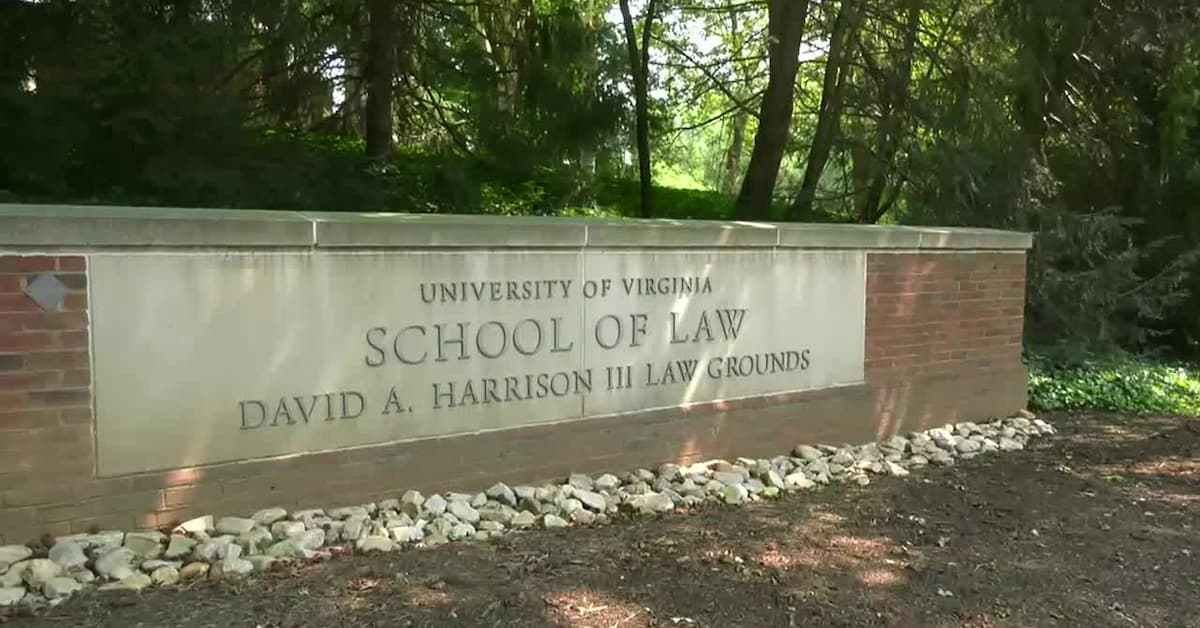
The University of Virginia School of Law ranks among the best law schools for contract law. Students receive top-tier education in contract law, preparing them for successful legal careers. The law school was established in 1819 and is located in Charlottesville, Virginia. The law school boasts a rigorous curriculum and distinguished faculty renowned for academic excellence. Alumni include Supreme Court justices, influential judges, and prominent legal scholars. The picturesque campus enhances the educational experience, fostering a vibrant community.
The University of Virginia School of Law offers several comprehensive law degree programs designed for various career goals and academic interests. The Juris Doctor (JD) program spans three years, full-time, providing a solid foundation in legal principles and practice. Required courses and electives allow students to tailor their education to their interests. Experiential learning is emphasized through clinics, externships, and simulation courses. The Master of Laws (LLM) program lasts one year, full-time, for lawyers who obtained their first degree in law outside the United States. The Doctor of Juridical Science (SJD) program, the highest law degree at UVA Law, requires candidates to produce a dissertation contributing original knowledge to the field of law.
The acceptance rate for the University of Virginia School of Law for the 2023-2024 academic year is approximately 11.46%. The median LSAT score for enrolled students is 171, and the median undergraduate GPA is 3.94. The 25th-75th percentile range for LSAT scores is 166-173, and for GPAs, 3.64-3.97. The statistics highlight the high academic standards of the admitted students. Tuition fees for the 2024-2025 academic year at the University of Virginia School of Law are set at $71,010 for Virginia residents and $73,328 for non-residents. Required fees total $3,690 for residents and $4,372 for non-residents. The total tuition and fees amount to $74,700 for residents and $77,700 for non-residents. The University of Virginia School of Law is ranked 4th overall in the U.S. News & World Report 2024 rankings and holds the top spot as the nation’s number one public law school. Specialty rankings include Business/Corporate Law at 6th, Clinical Training at 5th, Constitutional Law at 4th, and International Law at 7th. The school is renowned for academic excellence, distinguished faculty, and a strong alumni network. Emphasis on student quality of life and career prospects underscores its prestigious reputation.
The University of Virginia School of Law offers specialized programs in contract law that stand out. The Program in Law & Business explores the intersections of legal and business concepts. The Law & Public Service Program integrates public service principles with contract law studies. The Center for the Study of Race and Law provides a unique perspective on how contracts impact racial equality. The programs distinguish UVA’s contract law offerings from other institutions, ensuring a comprehensive and distinctive legal education.
The University of Virginia School of Law boasts a distinguished faculty with significant expertise in contract law. Cathy Hwang focuses on corporate contracts, publishing on nonparty interests, and the social cost of contracts. Kevin A. Kordana explores Rawlsian contractualism and taxation’s role in private law. George M. Cohen examines contract damages and negligence-opportunism tradeoffs. George S. Geis researches gift promises and contractual complexity, while Steven D. Walt studies penalty clauses and liquidated damages. J. H. Verkerke investigates employment contract law and behavioral economics. The faculty experts enhance UVA’s strong reputation in contract law education, making the institution one of the top law schools in Virginia.
The University of Virginia School of Law offers clinical opportunities that provide hands-on experience in contract law. The Entrepreneurial Law Clinic lets students work on real-world business transactions, assisting startups with contract drafting and negotiation. The Nonprofit Clinic allows students to handle contract creation and enforcement for nonprofit organizations. The Appellate Litigation Clinic involves contract law issues at the appellate level, offering experience in brief writing and oral arguments. The clinics equip students with essential skills for contract law practice.
The University of Virginia School of Law offers exceptional networking opportunities and has numerous notable alumni in contract law. Student organizations, including the American Constitution Society, provide platforms for networking and professional development. Career services host alumni luncheons, receptions, and the annual Law Alumni Weekend, connecting students with practicing attorneys. Notable alumni in contract law include David A. Skeel Jr., Erica Y. Williams, Joyce White Vance, and Richard H. McAdams. The alumni have significantly impacted contract law, governance, and legal theory.
The University of Virginia School of Law offers advanced contract law courses, providing students with a deep understanding of complex contractual issues. Students enroll in courses like Advanced Contracts, focusing on sophisticated contract interpretation and drafting. Elective courses include Commercial Paper, which covers negotiable instruments, and Secured Transactions, which explores secured interests in personal property. The curriculum emphasizes practical skills through simulation exercises and case studies. Students engage in seminars addressing contemporary issues in contract law, preparing them for real-world legal challenges. The offerings ensure a comprehensive grasp of contract law’s intricacies.
The University of Virginia School of Law boasts a 99.3% employment rate for the Class of 2023, with many graduates excelling in contract law roles.
Graduates secured 97.18% of full-time, long-term positions requiring Bar passage. Law firms employed 74.1%, with 88.5% at firms with over 500 attorneys. Judicial clerkships attracted 15.6%, primarily in federal courts. Public interest roles drew 7.1%, while 3.2% entered government positions. Private sector median salaries reached $225,000, and public sector roles offered a median of $71,960.
10. Georgetown University Law Center
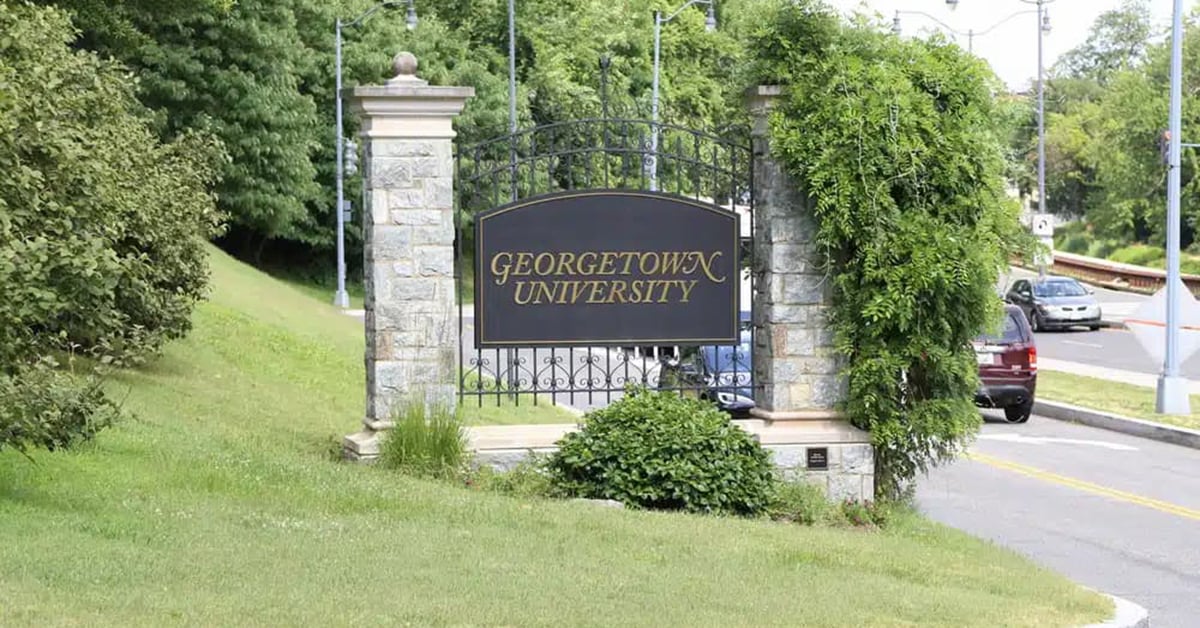
Georgetown Law School excels in contract law, ranking among the top institutions for the specialty. Georgetown Law, established in 1870, is situated in Washington, D.C. The school offers a comprehensive legal education, preparing students for diverse careers in law. The faculty includes renowned scholars and practitioners, ensuring a rich academic environment. Georgetown Law provides numerous clinics and externships, allowing practical experience alongside theoretical learning. Students benefit from the school’s proximity to federal agencies, courts, and international organizations. The institution remains dedicated to fostering a supportive and inclusive community.
Georgetown Law in Washington, D.C., offers prestigious law programs catering to various career goals. The Juris Doctor (JD) program, one of the largest and most diverse nationally, provides full-time and part-time options. Specialized Master of Law (LLM) programs include Taxation, Securities and Financial Regulation, Global Health Law, National Security Law, and International Business and Economic Law. The Doctor of Juridical Science (SJD) represents the most advanced law degree, focusing on intensive research. Georgetown’s programs emphasize a comprehensive legal education.
Georgetown University Law Center’s acceptance rate for the academic year 2023-2024 stands at approximately 19.57%. The median LSAT score for admitted students is 171, and the median undergraduate GPA is 3.91. Georgetown Law’s acceptance rate places the institution among the more selective law schools in the United States. Tuition fees for the 2024-2025 academic year are $79,672 annually for the full-time JD program and $2,812 per credit hour for the part-time program. The costs underscore the financial commitment required for a legal education at Georgetown Law School.
Georgetown Law School consistently ranks among the top law schools in the nation. The latest ranking from U.S. News places Georgetown Law at 14th overall. Specialties include a 3rd place ranking in clinical training, 2nd in part-time law, and 8th in contract law. Georgetown Law’s reputation for producing skilled and ethical lawyers is well-regarded, with a strong emphasis on public service and academic excellence. The school’s location in Washington, D.C., offers unique opportunities for students to engage in policy and legal practice.
Georgetown Law School offers specialized programs in contract law, emphasizing advanced legal theory and practical application. Students participate in the Contracts and Commercial Law Program, which focuses on modern contracting techniques and strategies. Unique features include a robust selection of contract negotiation and drafting courses and opportunities for hands-on experience through externships and clinics. The innovative approach and extensive resources distinguish Georgetown’s contract law programs from other institutions.
Georgetown Law School boasts a distinguished faculty with deep expertise in contract law. Professor David A. Wishnick specializes in financial regulation and contract law. David focuses on how law and technology shape financial markets and transactions. Professor Gregory Klass has extensive scholarship in contract law, contract interpretation, consumer contracts, and fraud liability. Professor Kevin Tobia’s research covers legal interpretation and contract design, contributing to significant publications in top law journals. Professor Eyal Zamir, renowned for his contract and commercial law background, enhances the department’s robust academic environment. The distinguished professors exemplify Georgetown’s commitment to academic excellence and innovation in contract law and legal education.
Georgetown Law School offers extensive clinical opportunities for students interested in contract law. The robust in-house clinical program includes various contract law clinics where students gain practical experience. One key clinic, the Social Enterprise and Nonprofit Law Clinic, allows students to provide legal assistance to social enterprises and nonprofit organizations. The clinic focuses on contract negotiation, drafting, organizational structure, and regulatory compliance. Georgetown’s Commercial and Advanced Contract Law Practicum integrates law, business, and public policy. Students gain hands-on experience in real-world contract-related projects.
Georgetown Law School offers a range of networking opportunities for students interested in contract law. The school hosts numerous events where students connect with alumni and professionals, including receptions, panels, and career fairs. The Hoya Gateway Law Hub facilitates career-related conversations between students and alumni, offering informational interviews, resume reviews, and job shadowing. Notable alumni in contract law include Randy Nahlé, a partner at Milbank LLP, and Ivana Djak, a litigation associate at Clifford Chance. The resources reflect Georgetown’s dedication to student success and professional development in contract law.
Georgetown University Law School offers an advanced Contract Law course focusing on complex legal principles and practical applications. Topics include contract formation, performance, breach, and remedies. Students explore advanced theories of contract interpretation and enforceability. Case studies on commercial transactions highlight real-world contract issues faced by businesses. Extensive reading materials and legal texts provide comprehensive knowledge. Drafting contracts, negotiating terms, and resolving disputes through arbitration and litigation are key components of the course. Guest lectures from industry experts enhance learning. The course culminates in a final project, requiring detailed analysis of intricate contract scenarios.
Georgetown University Law School’s employment outcomes for recent graduates are impressive. The Class of 2023 saw 89.3% of graduates securing long-term, full-time legal positions. Comprehensive career services and a robust alumni network contribute significantly to the outcomes. Employment statistics reflect strong placement in prestigious law firms, government agencies, and public interest organizations. The success underscores the law school’s commitment to preparing students for diverse legal careers, including contract law.
11. New York University Law School

New York University School of Law is one of the best law schools for contract law. The school’s strong emphasis on contract law has earned the institution a top-tier reputation. The school was established in 1835 and is located in Greenwich Village, New York City. The school offers a wide range of legal programs and consistently ranks among the top law schools in the United States. The academic excellence of the school attracts students from around the world. The faculty includes leading scholars and practitioners. Students benefit from the school’s extensive resources and vibrant campus life.
New York University School of Law offers a three-year Juris Doctor (JD) program. The program includes a comprehensive curriculum covering various law areas, offering over 300 courses and 16 areas of study. Students gain practical experience through clinics and externships, with dual degrees and specializations available. A strong emphasis exists on public interest law and global legal studies. The Master of Laws (LLM) program, which lasts one year and is full-time, welcomes US and international students. Specializations include Taxation, International Business Regulation, Litigation, and Arbitration, with opportunities for clinics and externships.
The acceptance rate for New York University School of Law for the 2023-2024 academic year stands at 15.65%. Enrolled students have an average LSAT score of 172 and an average GPA of 3.88. The tuition and fees for the 2023-2024 academic year at New York University School of Law total $80,014, reflecting a 4.88% increase from the previous year. The estimated cost of attendance, including living expenses, books, supplies, and other personal costs, is $109,458. The comprehensive budget offers prospective students a complete financial overview.
New York University School of Law ranks fifth in the nation, according to usnews.com. Contract law is ranked second, criminal law is ranked third, constitutional law is ranked fourth, and international law is ranked fifth. The school is renowned for academic excellence, influential faculty, and a diverse, inclusive community. Graduates achieve leadership roles in law, business, and public service sectors. New York University School of Law offers specialized programs in contract law, including courses like Contract Theory and Advanced Contract Law. Unique features include the Transactional Law Program, which emphasizes practical skills through simulations and workshops. The Center for Contract and Economic Organization provides interdisciplinary research opportunities. Students gain access to international contract law perspectives through the Global Fellows Program. The Business Transactions Clinic offers hands-on experience in contract law, setting NYU apart from other law schools.`
New York University School of Law boasts a distinguished faculty with deep expertise in contract law. Key faculty members include Professor Richard Epstein, renowned for his classical contract theory work. Professor Clayton Gillette focuses on contract law within local government and public law. Professor Kevin Davis offers a global perspective through his work on contracts in international development. The faculty members’ extensive practical and theoretical knowledge ensures students receive a comprehensive education in contract law at NYU.
New York University School of Law offers extensive clinical opportunities in contract law through its Business Transactions Clinic. The clinic provides free legal services related to business, transactional, and advisory matters to nonprofit organizations, social enterprises, cooperatives, and under-resourced entrepreneurs. Students engage in business planning, entity formation, commercial transactions, corporate governance, and compliance with laws and regulations. Students work in teams, gaining hands-on experience in contract law under close faculty supervision.
New York University School of Law offers extensive networking opportunities and boasts notable alumni in contract law. Networking events, speaker series, and mentorship programs facilitate connections. The AnBryce Scholarship Program provides scholars access to executives and mentors through events featuring prominent figures Kenneth Langone and Cheryl Mills. The Contract Theory and Law Colloquium brings together practitioners and scholars to discuss contract law topics, enhancing networking opportunities. Notable alumni in contract law include Richard Epstein and Richard P. Swanson.
NYU stands out among the best law schools in New York for its exceptional contract law program. New York University School of Law offers a comprehensive curriculum in contract law, emphasizing advanced and elective courses. Students take Advanced Contract Law, focusing on complex contractual issues and modern commercial practices. The Comparative Contract Law course examines differences and similarities in contract laws across various jurisdictions. The Negotiation and Drafting of Contracts course equips students with practical skills for drafting and negotiating agreements. Contract Theory delves into the theoretical foundations of contract law, exploring concepts and principles that underpin contractual obligations. The courses provide students with a deep understanding of contract law’s practical and theoretical aspects.
New York University School of Law boasts impressive employment outcomes for graduates, including in contract law. The Class of 2023 saw 97.06% of graduates securing employment within ten months. A majority, 64.8%, entered private practice, particularly at firms with 500 attorneys or more. Public interest roles accounted for 21.68% of employment, and judicial clerkships comprised 7.93%. Employment remained concentrated in the Mid-Atlantic region, with 71.56% of graduates predominantly in New York. Graduates enjoyed strong financial prospects, evidenced by a median salary of $215,000.
12. University Of Michigan Law School
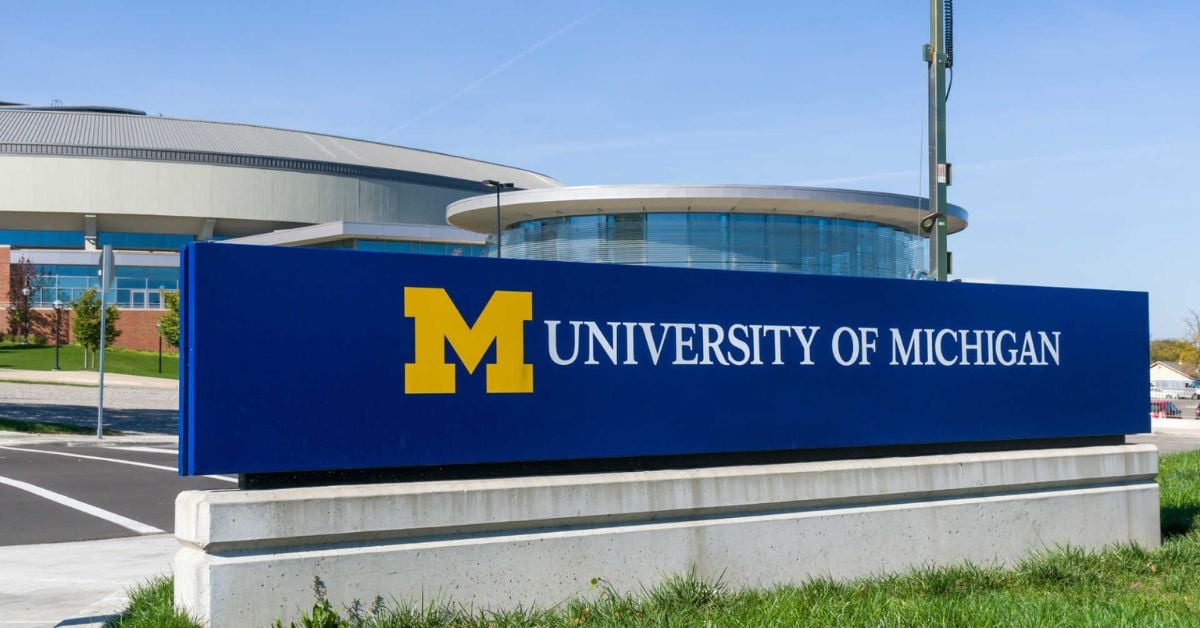
The University of Michigan Law School stands out as one of the best for contract law, offering an exceptional education in the field. The school, established in 1859, has maintained a reputation for academic excellence.
The University of Michigan Law School, located in Ann Arbor, boasts a long history of producing distinguished legal professionals. The curriculum, recognized for innovative learning methods, integrates theoretical knowledge with practical skills. ABA accreditation underscores the school’s commitment to high standards. An inclusive environment promotes diversity and encourages intellectual growth among students.
The University of Michigan Law School provides various law degree programs. The Juris Doctor (JD) program delivers a robust curriculum encompassing essential legal principles and practical skills. Students participate in hands-on learning through clinics, externships, and moot court competitions, preparing graduates for diverse legal careers. The Master of Laws (LLM) program targets lawyers trained outside the United States, offering a customizable curriculum to achieve individual academic and professional goals. The Doctor of the Science of Law (SJD) program focuses on aspiring legal scholars who require rigorous coursework and a dissertation to contribute original research to the law field.
The University of Michigan Law School has an acceptance rate of 12.58% for the academic year 2023-2024. The average LSAT score for admitted students stands at 171, and the average GPA is 3.85. An enrollment yield of 34.03% reflects the percentage of admitted students who choose to enroll at the law school. The tuition and fees for the academic year 2023-2024 are $69,584 for Michigan residents and $72,584 for out-of-state students. The estimated total attendance cost, including tuition, living costs, books, and personal expenses, is $93,728 for Michigan residents and $96,728 for out-of-state students. The University of Michigan Law School ranks 9th in the nation according to the latest U.S. News & World Report rankings. The contract law program holds the 7th position, environmental law ranks 4th, and intellectual property law stands at 10th. The University of Michigan Law School, renowned for academic excellence, attracts top-tier faculty and students. The institution fosters a collaborative and innovative learning environment, consistently producing leaders in various legal fields.
The University of Michigan Law School offers a robust contract law curriculum, focusing on advanced courses and elective options. Contract Theory explores the economic and philosophical foundations of contract law. Students delve into complex agreements, negotiations, and enforcement mechanisms. Commercial Transactions examines the Uniform Commercial Code’s application to sales, leases, and secured transactions. Students analyze cross-border agreements in the International Contracts course, considering global trade laws and dispute resolution. Contract Drafting hones practical skills in creating clear and enforceable agreements. Each course integrates real-world scenarios, enhancing analytical and drafting competencies essential for future legal professionals specializing in contract law.
The University of Michigan Law School boasts distinguished faculty in contract law. Professor Gabriel Rauterberg, with expertise in corporate governance and securities regulation, has his research cited by SEC commissioners and the Delaware Court of Chancery. Albert H. Choi, an authority on corporate law and finance, publishes in top economics and law journals. Nicolas Cornell merges moral philosophy with private law doctrine, contributing to leading philosophy and law reviews. The professors provide extensive knowledge and practical insights from their acclaimed research and professional experiences in contract law.
The University of Michigan Law School offers several clinical opportunities in contract law through the Community Enterprise Clinic (CEC) and the Civil-Criminal Litigation Clinic (CCLC). The Community Enterprise Clinic provides transactional legal assistance to nonprofits, community-based organizations, social enterprises, and small businesses. Students draft, negotiate, and review various contracts and agreements. The topics include commercial leases, MOUs, purchase and sale agreements, and vendor agreements. Hands-on experience comes from working with clients on legal issues related to tax, intellectual property, real estate, employment, and risk management. The clinics ensure practical expertise in transactional and litigation aspects of contract law, preparing graduates for diverse legal careers.
The University of Michigan Law School offers numerous networking opportunities and boasts a notable alumni network in contract law. Michigan Law Connect, an online networking and mentorship platform, allows current students and alumni to connect, focusing on contract law professionals. The Alumni Directory offers a searchable online resource for finding contacts based on contract law practice areas and locations. Meet the Employers provides interaction opportunities with potential employers from various sectors, including lawyers specializing in contract law. Alumni-Student Mentoring Programs offer career insights and advice, specifically in contract law. Summer OCI and On-Campus Interviews facilitate essential networking and job placement in contract law. The resources ensure students advance their careers in contract law.
The University of Michigan Law School offers a comprehensive contract law curriculum with advanced and elective courses. Students explore complex contract principles, including commercial contracts, international transactions, and contract theory. Courses cover drafting and negotiating contracts, focusing on practical skills and legal strategies. Topics include remedies for breach, contract interpretation, and enforceability issues. Elective courses include specialized areas, including employment contracts, intellectual property licensing, and e-commerce agreements. Practical workshops and simulation exercises provide hands-on experience. The contract law program stands out among the top law schools in Michigan. The curriculum prepares students for diverse legal careers, equipping them with comprehensive knowledge and practical skills essential for contract law practice.
The University of Michigan Law School boasts impressive employment outcomes for graduates, particularly in contract law. The Class of 2023 achieved a 95.4% employment rate in long-term, full-time legal jobs. Graduates found opportunities across various sectors, including law firms, clerkships, public interest roles, and government positions. The most popular employment markets included New York, Washington, D.C., Illinois, California, and Michigan. Median salaries were $215,000 for private practice roles and approximately $72,000 for government positions. The statistics highlight the broad range of opportunities and strong career support provided by the Office of Career Planning.
13. Northwestern Pritzker School Of Law
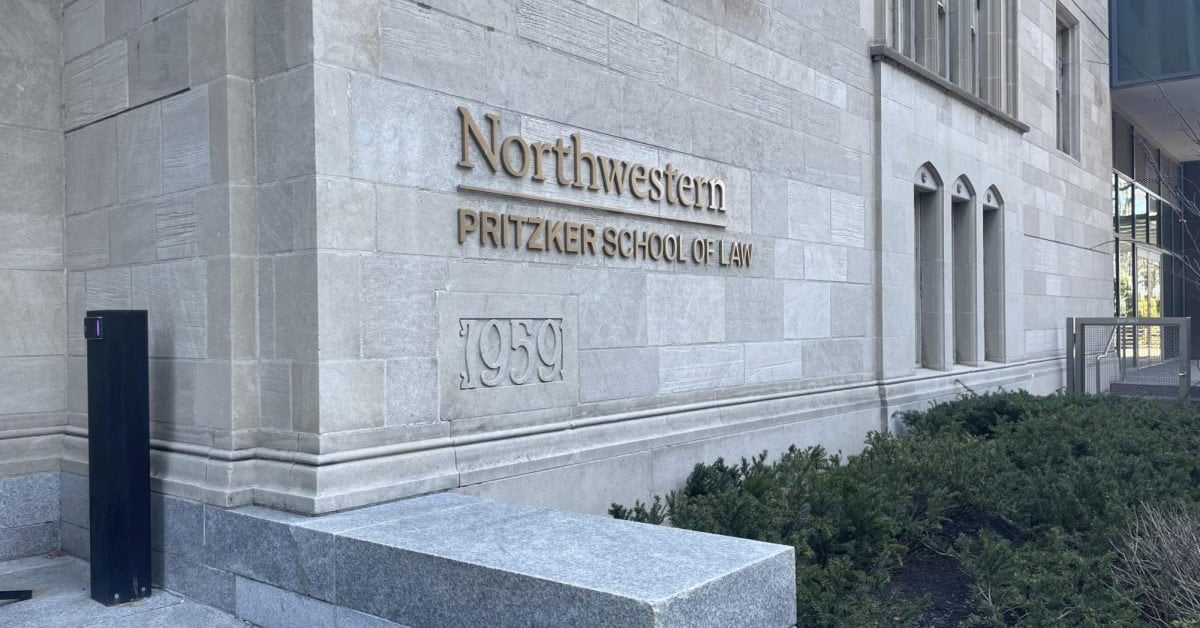
Northwestern University Pritzker School of Law ranks among the best law schools for contract law. Students gain extensive knowledge and practical skills in contract law, making the institution highly regarded. The school, located in Chicago, Illinois, was established in 1859. The school offers a variety of degrees and certificates, providing students with numerous opportunities for specialization. A strong emphasis on experiential learning ensures graduates are well-prepared for legal practice. The campus features state-of-the-art facilities, fostering a collaborative and engaging learning environment. Northwestern University Pritzker School of Law offers a variety of programs tailored to diverse student needs. The Juris Doctor (JD) programs include a traditional three-year track, a two-year JD for international lawyers, and an accelerated two-year option. Joint degrees combine a JD with an MBA, PhD, or LLM in Taxation and International Human Rights. Master of Laws (LLM) programs specialize in taxation and human rights. Executive LLM programs target mid-career professionals in Chicago and Seoul. The Master of Science in Law (MSL) serves STEM professionals seeking relevant legal knowledge. The programs ensure comprehensive legal education for all students.
Northwestern University Pritzker School of Law has an acceptance rate of 15.53% for the 2024 admissions cycle. The median LSAT score for admitted students is 172, and the median undergraduate GPA is 3.92. The law school emphasizes interdisciplinary and social justice research, with numerous faculty members holding PhDs, contributing to a rich academic environment. The tuition for the Juris Doctor (JD) program during the 2024-2025 academic year is $76,704 per year. The rate applies to the traditional JD program and the Two-Year JD program for international lawyers. Mandatory fees include an $828 health services fee, with additional costs for housing, books, personal expenses, and transportation estimated separately. Northwestern University Pritzker School of Law ranks #9 among law schools according to U.S. News & World Report. Specialty rankings include #2 in tax law, #3 in dispute resolution, #8 in clinical training, and #9 in contract law. The interdisciplinary approach distinguishes the school. Emphasis on work experience and diversity shapes the student body. Ninety percent of students have at least one year of full-time work experience.
Northwestern University Pritzker School of Law offers specialized programs in contract law. The LLM in Contracts and Commercial Law provides in-depth knowledge of contract principles and commercial transactions. A unique feature is that the JD-LLM joint Business Law degree includes specialized contract negotiation and drafting courses. A rigorous Executive LLM in Corporate Law focuses on advanced contract strategies for executives. Students gain hands-on experience through clinics and externships, setting Northwestern apart from other institutions.
Northwestern University Pritzker School of Law features faculty experts in contract law. Max M. Schanzenbach, a Seigle Family Professor, focuses on economic analysis and empirical studies in contract law. Sarah B. Lawsky integrates artificial intelligence and formal logic into contract law research. Daniel W. Linna Jr. emphasizes computational techniques and innovation in contract law education. Kyle Rozema’s expertise in law and economics offers quantitative insights into contracts. Paul A. Gowder explores legal and institutional governance relating to contracts. The expertise solidifies Northwestern’s leadership in contract law.
Northwestern University Pritzker School of Law offers clinical opportunities in contract law through the Bluhm Legal Clinic. Students handle real cases involving contract drafting and negotiation. The Donald Pritzker Entrepreneurship Law Center focuses on transactional law and entrepreneurial contracts. Participation in the Center on Negotiation, Mediation, and Restorative Justice refines students’ dispute-resolution skills related to contracts. The programs provide hands-on experience, preparing students for practical legal challenges and distinguishing Northwestern’s clinical offerings from other institutions.
Northwestern University Pritzker School of Law excels in providing networking opportunities in contract law through various initiatives and events. The Bluhm Legal Clinic offers practical experience and connects students with professionals in contract law. Alumni events, including the Latinx Alumni and Student Networking Mixer, create connections between current students and successful graduates in contract law sectors. Notable alumni specializing in contract law include Javier Rodríguez Soler. Javier transitioned into corporate strategy and utilized his contract law education from Northwestern to excel. Other distinguished alumni are Henry B. Hansmann and Robert W. Gordon. The strong alumni network in contract law ensures ongoing support and opportunities for current students and graduates.
Northwestern University Pritzker School of Law offers advanced contract law courses focusing on practical and theoretical aspects. Students enroll in “Advanced Contracts: Negotiation and Drafting,” emphasizing drafting skills and negotiation strategies. “Commercial Contract Law” explores complex commercial transactions and the legal principles governing them. “Contract Litigation” addresses dispute resolution and litigation processes in contract law. “International Contract Law” covers cross-border contract issues, including international trade agreements and jurisdictional challenges. Elective courses, including “Contract Theory” and “Law of Sales,” provide an in-depth understanding of contract principles and specific contract types. The courses prepare students for specialized practice in contract law.
The University of Michigan Law School graduates achieve outstanding employment outcomes, especially in contract law. The class of 2023 saw 98.9% of graduates employed within ten months, with many entering prestigious law firms, government roles, and public interest positions. A significant 65.2% of the 2023 graduates secured positions in Big Law firms, including top employers Kirkland & Ellis and Sidley Austin. The impressive statistics highlight the strong career support and opportunities provided by Northwestern Law, especially in contract law.
How To Choose Law Schools To Contract Law?

To choose law schools in contract law, follow the five steps listed below.
- Research Law Schools’ Specialization in Contract Law. Aspiring lawyers need to investigate each law school’s focus on contract law. Key elements include specialized courses, experienced faculty members, and research opportunities. Students must look for schools with strong academic programs in contract law, where faculty have significant expertise and publish relevant research. The specialization provides a robust foundation in contract law principles, preparing students for successful careers.
- Examine Law Schools’ Rankings and Reputation in Contract Law. Aspiring lawyers must consider rankings and reputation in contract law when choosing a law school. Higher-ranked schools provide better resources, networking opportunities, and job placements. Research each school’s overall ranking and specific ranking in contract law. Alumni success and employer perceptions contribute to a school’s reputation. Choosing a highly regarded school enhances career prospects and provides a competitive edge in the job market.
- Evaluate Curriculum and Course Offerings. Students need to scrutinize the curriculum and course offerings related to contract law. Look for a comprehensive range of courses covering fundamental and advanced topics in contract law. Schools offering practical skills training, such as negotiation and drafting contracts, provide valuable hands-on experience. Elective courses, seminars, and workshops focusing on contract law enhance understanding and expertise. Analyzing course content and structure ensures that the chosen school aligns with career goals and interests in contract law.
- Investigate Internship and Externship Opportunities. Internships and externships play a crucial role in gaining practical experience in contract law. Aspiring lawyers must explore the availability and quality of the opportunities at each law school. Schools with strong connections to law firms, corporations, and government agencies offer valuable placements. The experiences provide real-world insights and networking opportunities, essential for career development. Investigating the success of previous students in securing internships and externships helps make an informed decision.
- Consider Alumni Network and Career Services. The strength of a law school’s alumni network and career services in contract law significantly impacts career prospects. Aspiring lawyers must assess the support provided by the school’s career services, including job placement rates, career counseling, and networking events. A strong alumni network offers mentorship, job leads, and professional connections in contract law. Researching alumni success stories and involvement in contract law provides insights into the school’s effectiveness in preparing students for successful careers.
What Is Contract Law?
Contract law is a legal field that governs the creation, execution, and enforcement of agreements between parties. Contract law ensures that promises made in a contract are legally binding and are upheld in court. The law protects the parties’ rights and provides remedies in case of breach. Contract law covers various contracts, including sales, services, employment, and leases. Contract law aims to create a fair and predictable legal framework, encouraging trust and cooperation in business and personal transactions. The legal field is fundamental to commerce and daily interactions.
Contract law governs the formation, execution, and enforcement of agreements between parties. A contract represents a legally binding promise, with each party agreeing to fulfill specific obligations. Essential elements of a valid contract include offer, acceptance, consideration, capacity, and legality. The offer signifies a party’s willingness to agree to specific terms. Acceptance reflects the other party’s consent to the terms. Consideration involves something of value exchanged between the parties, ensuring the contract’s enforceability. Capacity refers to the legal ability of the parties to enter into a contract. Capacity ensures individuals comprehend the terms and consequences. Legality ensures the contract’s subject matter aligns with the law, voiding any agreement involving illegal activities. Breach of contract occurs when a party fails to perform as agreed. Legal remedies for breach of contract include damages, specific performance, or contract rescission.
Contract law encompasses various types of agreements, including express and implied contracts. Express contracts involve clearly stated terms, either orally or in writing. Implied contracts arise from the parties’ actions or conduct. Bilateral contracts involve mutual promises between the parties. Unilateral contracts involve one party promising something in return for the other’s performance. Contract law covers performance standards, defining how obligations must be fulfilled. Complete performance meets all contractual terms, and substantial performance occurs when a party fulfills most terms with minor deviations. Material breach signifies a significant failure to perform, justifying the non-breaching party’s right to terminate the contract and seek damages.
Remedies for breach of contract aim to return the injured party to their original position as if the breach never happened. Compensatory damages cover direct losses and costs, while consequential damages address indirect losses resulting from the breach. Specific performance orders the breaching party to fulfill their contractual obligations, which are used in cases involving unique goods or real estate. Contract rescission cancels the agreement, releasing parties from further obligations and returning any exchanged benefits. Contract law, therefore, is the foundation of business transactions, personal agreements, and legal obligations. Contract law ensures parties adhere to their promises and provides mechanisms for resolving disputes when they arise.
What Are The Best Applications Of Contract Law?
The five best applications of contract law are listed below.
- Business Agreements and Commercial Transactions: Business agreements and commercial transactions represent the best application of contract law. Companies use contracts to outline terms for sales, leases, and services. Contracts ensure all parties fulfill their obligations, providing legal recourse if breaches occur. Precise terms and conditions in contracts minimize disputes and protect business interests. The clarity and enforceability of contracts make them essential tools for commercial success.
- Employment Contracts: Employment contracts are another best application of contract law. Employment contracts define the rights and responsibilities of employers and employees. The contracts cover salary, benefits, work hours, and termination conditions. The agreements help prevent misunderstandings and disputes, ensuring a stable and fair workplace. The enforceability of employment contracts provides security and clarity for all parties involved.
- Real Estate Transactions: Real estate transactions exemplify the best application of contract law. Buying, selling, or leasing property requires detailed contracts to specify terms and conditions. The contracts address payment schedules, property conditions, and transfer of ownership. Accurate real estate contracts protect buyers, sellers, and tenants by clearly defining their rights and obligations. Contract law ensures the integrity and legality of property transactions.
- Construction Contracts: Construction contracts are the best application of contract law and are crucial for outlining project details. The contracts include specifications on materials, timelines, costs, and responsibilities of each party involved. Construction contracts help manage expectations, reduce risks, and provide mechanisms for resolving disputes. The enforceability of the contracts ensures projects are completed as agreed, protecting the interests of all stakeholders.
- Licensing Agreements: Licensing agreements demonstrate another best application of contract law. The contracts allow one party to use another’s intellectual property, such as patents, trademarks, or copyrights. Licensing agreements specify usage rights, royalties, and duration. Licensing agreements protect intellectual property owners while allowing licensees to benefit from using the property. Contract law provides a framework for fair and enforceable licensing agreements.
What Do Contract Lawyers Major In?
Contract lawyers major in Political Science, Business Administration, and English. Political Science focuses on government systems, political behavior, and legal principles. Students learn about the structure and function of government, which is essential for understanding contract laws and regulations. Courses include constitutional law, international relations, and public policy analysis. Business Administration covers management principles, finance, and organizational behavior. The major provides a solid foundation in understanding business operations, which is essential for drafting and interpreting contracts. Students study accounting, marketing, and strategic management subjects, preparing them to handle commercial agreements effectively. English emphasizes critical thinking, writing, and analysis. Proficiency in clear and concise communication is crucial for contract lawyers. Literature courses develop analytical skills, while writing-intensive classes hone the ability to draft precise legal documents. Mastery of language ensures contract terms are unambiguous and enforceable. Each major equips future contract lawyers with a unique set of skills necessary for their careers.
Business Administration is the best major for contract lawyers. The major provides a comprehensive understanding of business operations, which is essential for drafting and interpreting contracts. Students learn about management principles, finance, and organizational behavior, which are crucial for handling commercial agreements. Knowledge of accounting and strategic management prepares lawyers to navigate complex business environments. Business Administration emphasizes negotiation skills and risk management, which are vital for contract negotiations. The major offers a balanced blend of practical and theoretical knowledge, making graduates well-equipped to deal with various aspects of contract law. Understanding business operations from the inside helps contract lawyers create more effective and enforceable agreements. Business Administration stands out by directly relating to the everyday tasks of contract lawyers, providing a solid foundation for success in contract law.
How To Become A Contract Lawyer?
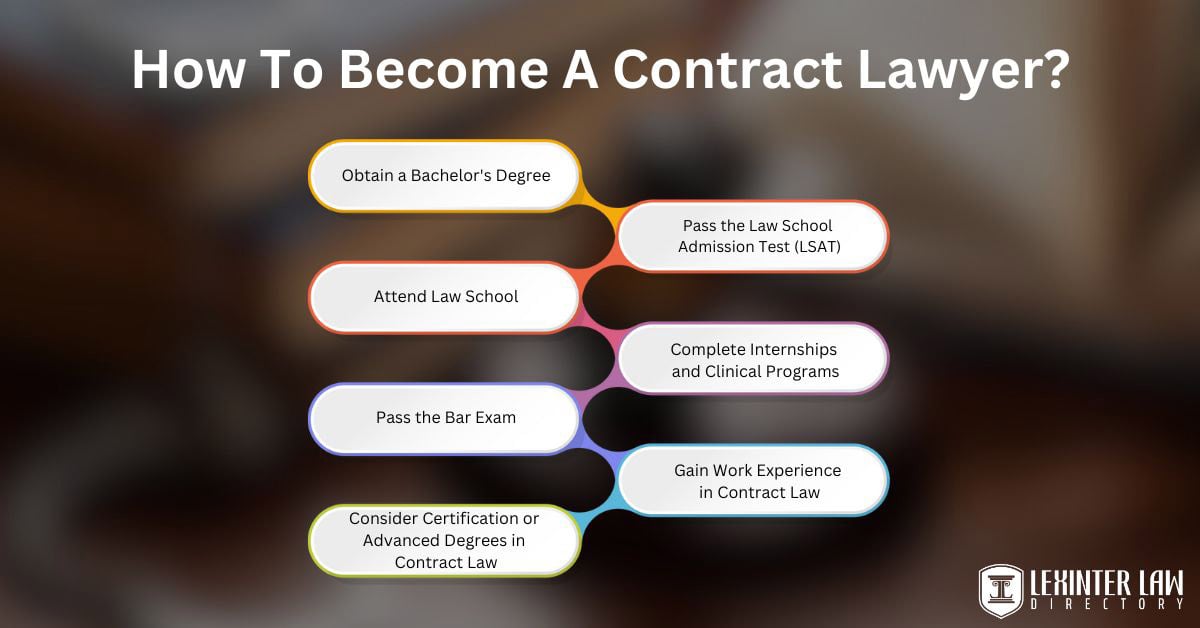
To become a contract lawyer, follow the seven steps listed below.
- Obtain a Bachelor’s Degree. Aspiring contract lawyers must start with a Bachelor’s degree in any field. Degrees in political science, business, or pre-law provide a strong foundation. Coursework must focus on developing critical thinking, writing, and research skills. The foundational education prepares students for the rigorous law school curriculum required for a career in contract law.
- Pass the Law School Admission Test (LSAT). A high score on the Law School Admission Test (LSAT) is essential for admission to law school. The standardized test assesses reading comprehension, logical reasoning, and analytical thinking. Aspiring contract lawyers must invest significant time in LSAT preparation. The preparation includes taking practice exams and, if needed, attending preparatory courses to achieve a competitive score.
- Attend Law School. Law school, generally lasting three years, grants a Juris Doctor (JD) degree upon completion. Attending law school is mandatory to become a contract lawyer. Courses cover various legal disciplines, including contracts, torts, property law, and constitutional law. Aspiring contract lawyers must participate in extracurricular activities, including moot court and internships. Extracurricular activities offer practical experience and networking opportunities within the legal field.
- Complete Internships and Clinical Programs. Practical experience through internships or clinical programs is crucial during law school. The opportunities allow aspiring contract lawyers to work under the supervision of experienced attorneys, gaining hands-on experience in contract law. Internships provide insights into daily legal practice, helping students apply theoretical knowledge in real-world scenarios.
- Pass the Bar Exam. Aspiring contract lawyers must pass the Bar exam in the state where they intend to practice after graduating from law school. The Bar exam tests knowledge of general legal principles and state-specific laws. Preparation involves studying comprehensive review materials, attending Bar review courses, and completing practice exams to ensure readiness for the challenging test.
- Gain Work Experience in Contract Law. Entry-level positions at law firms, government agencies, or corporations help new lawyers gain experience in contract law. Practical experience in drafting, reviewing, and negotiating contracts is invaluable. Aspiring contract lawyers must seek mentorship from seasoned professionals for guidance and insights into contract law.
- Consider Certification or Advanced Degrees in Contract Law. Certification or advanced degrees enhance a contract lawyer’s credentials. Programs providing a Master of Laws (LL.M.) in contract law or business law offer specialized knowledge. Certifications from recognized legal organizations demonstrate expertise and commitment to the field. The qualifications lead to career advancement and higher earning potential.
How Long Would It Take To Study Contract Law?
It would take about seven years to study contract law. The timeline includes several key steps and milestones. First, aspiring contract lawyers must complete a Bachelor’s degree, which generally takes four years. Common pre-law majors include political science, history, and economics. Students take the LSAT, which requires several months of preparation following their Bachelor’s degree. The LSAT assesses critical thinking, logical reasoning, and reading comprehension skills, essential for success in law school. Students apply to law schools after passing the LSAT and, upon acceptance, begin a Juris Doctor (JD) program. The JD degree generally lasts three years in the United States. The first year focuses on foundational courses, including constitutional law, civil procedure, and legal writing. Contract law is introduced during the first year, providing students with a basic understanding of contractual agreements and their legal implications.
The second and third years allow students to delve deeper into contract law through elective courses and seminars. The courses cover advanced topics like contract drafting, negotiation, and remedies for breach of contract. Students have opportunities to participate in moot court competitions and internships, gaining practical experience in contract law. Completing a JD degree qualifies graduates to sit for the Bar exam, a requirement for practicing law. Passing the Bar exam demonstrates a comprehensive understanding of various legal areas, including contract law. Bar exam preparation spans several months, with intensive study and review. Continuing education and professional development remain essential for lawyers specializing in contract law. Attending workshops, seminars, and conferences helps them stay updated on legal developments and trends.
Studying contract law and becoming a practicing lawyer requires about seven years, including four years for a Bachelor’s degree and three years for a JD program. The comprehensive education equips graduates with the knowledge and skills needed to excel in contract law.
Is The Contract Law Hard?
Yes, contract law is hard. Contract law is hard due to the complexity of legal principles and rules. Legal jargon and technical terms challenge aspiring contract lawyers to understand the terms. Mastering numerous statutes, precedents, and case laws requires intense study and comprehension. Drafting contracts demands precision and clarity, preventing ambiguity leading to disputes in contract law. Attention to detail is crucial in contract law, as a minor error results in significant legal consequences. The dynamic nature of contract law adds another layer of difficulty. Laws and regulations evolve, requiring constant knowledge updating. Navigating different types of contracts, from employment agreements to international trade deals, involves diverse legal standards and practices.
Interpreting contractual obligations and rights calls for analytical thinking and problem-solving skills. Lawyers must anticipate potential issues and address them proactively in contract terms. Understanding the parties’ intentions and ensuring their interests align with legal requirements complicates the process further. Contracts involve negotiation, where balancing parties’ demands while ensuring compliance with the law proves challenging. Legal professionals must possess strong negotiation skills and an in-depth understanding of contract law principles. Resolving contract disputes through litigation or arbitration requires expertise in presenting evidence and arguments effectively. The combination of the legal factors makes contract law hard and an intricate field to master.
What Is The Difference Between A Contract Lawyer And An Employment Lawyer?
The difference between a contract lawyer and an employment lawyer lies in their specializations and the legal issues they handle. A contract lawyer focuses on drafting, reviewing, and negotiating contracts. An employment lawyer specializes in issues related to the workplace and the employer-employee relationship. Contract lawyers ensure agreements between parties are legally sound and enforceable. Employment lawyers handle discrimination, wrongful termination, and workplace harassment. Contract lawyers work with various types of contracts, including business agreements and real estate transactions. Employment lawyers address wage and hour disputes and compliance with labor laws.
The difference between a contract lawyer and an employment lawyer is the specific focus of their legal practice. The difference in their legal focus affects the specific skills and knowledge required for their practice. Contract lawyers need a thorough understanding of contract law, negotiation techniques, and the ability to draft precise legal documents. Employment lawyers require knowledge of federal and state labor laws and regulations and the ability to navigate complex workplace issues. The lawyers must stay updated on changes in employment law to represent their clients effectively. The difference between their work environments distinguishes the two types of lawyers. Contract lawyers work in law firms, corporate legal departments, or as solo practitioners. Employment lawyers work in law firms, government agencies, non-profit organizations, or in-house legal departments of companies.
The similarities between a contract lawyer and an employment lawyer include their need to interpret and draft legal documents. Possessing strong analytical and negotiation skills is essential for contract and employment lawyers. Legal expertise remains crucial as they frequently ensure documents comply with the law. Advising clients on legal matters and representing them in disputes constitutes a significant part of their responsibilities. The lawyers aim to protect clients’ interests and provide sound legal counsel when handling contractual issues or employment concerns. The importance of legal proficiency, strong communication skills, and the ability to navigate complex legal landscapes is highlighted by their professional responsibilities. Achieving favorable client outcomes remains a central and common goal for contract and employment lawyers.
How To Find A Good Contract Lawyers Near Me With Lexinter?
To find a good contract lawyer near me with Lexinter, start by visiting the Lexinter law directory. Hundreds of thousands use the online tool daily to locate attorneys specializing in various legal fields, including contract law. Lexinter features a comprehensive list of contract lawyers, including their firm names, addresses, phone numbers, credentials, and hours of operation. Contract lawyers register their firms on Lexinter, enhancing their online presence. Each premium listing includes links to their Google My Business profile, social media profiles, and websites. The premium listing makes it easier for potential clients to find them and schedule consultations in person or over the phone.
Lexinter allows users to search by city, state, or region and filter by specific law categories, including contract law. The feature simplifies finding a contract lawyer who meets particular needs. Contract lawyers submit a request to have their firms included in the directory, ensuring their contact information reaches individuals in need of legal assistance. Lexinter’s user-friendly interface connects people with top contract law attorneys across America. The directory helps individuals find answers to their legal questions and secure the representation they need to protect their interests. Lexinter helps people find and connect with qualified contract lawyers quickly and easily.

